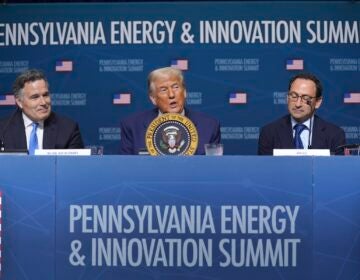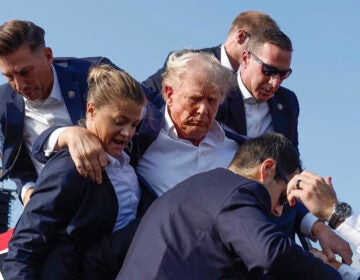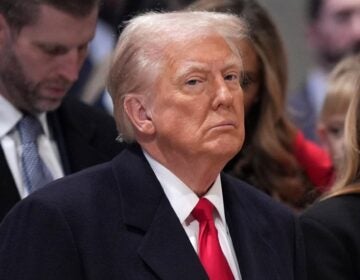Election 2024 updates: Harris and Trump spar over abortion, economy in Philly debate; Delaware primary results
In a historic debate, Kamala Harris and Donald Trump offered starkly different views of America's future.
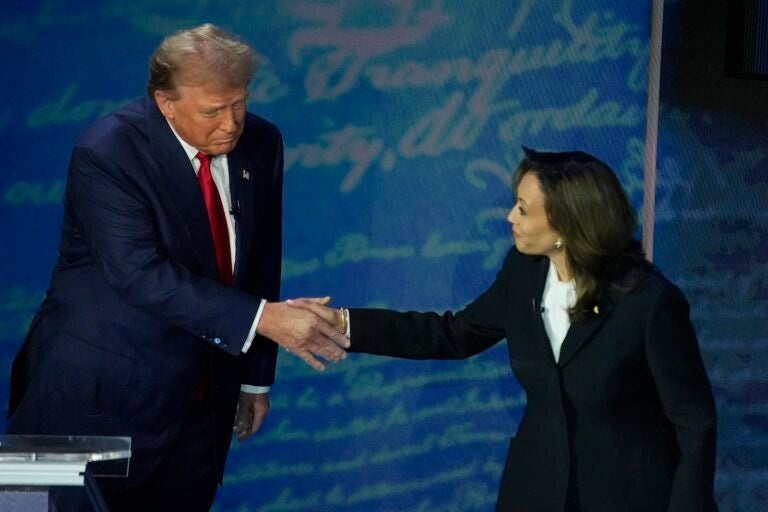
Republican presidential nominee former President Donald Trump shakes hands with Democratic presidential nominee Vice President Kamala Harris during an ABC News presidential debate at the National Constitution Center, Tuesday, Sept.10, 2024, in Philadelphia. (AP Photo/Alex Brandon)
What you need to know
- The first presidential debate between Harris and Trump is in the books. Here are some key takeaways, and here’s how Democratic and Republican voters in Pa. reacted
- Harris pressed a more forceful case against Trump than Biden did on abortion, the economy and democracy, and earned an endorsement from Taylor Swift as a “Childless Cat Lady”
- In Delaware, Delaware Gov. John Carney will become Wilmington’s next mayor and Meyer defeated scandal-plagued Hall-Long and O’Mara in the state’s Democratic primary for governor
- Here’s a full look the winners and losers of Delaware’s primary election
Election 2024 dispatches
-
Republican, Democrat voters in Pa. impressed, surprised by Harris’ debate performance
Sep. 11, 2024 1:29 am
-
Key takeaways from the Harris-Trump debate in Philadelphia
Sep. 10, 2024 11:44 pm
-
Who won in Delaware’s primary election
Sep. 11, 2024 12:01 am
-
Delaware Gov. John Carney becomes Wilmington’s next mayor
Sep. 10, 2024 10:37 pm
-
Kamala Harris and Donald Trump on key issues, from democracy and immigration to tariffs and trade
Sep. 10, 2024 6:52 pm
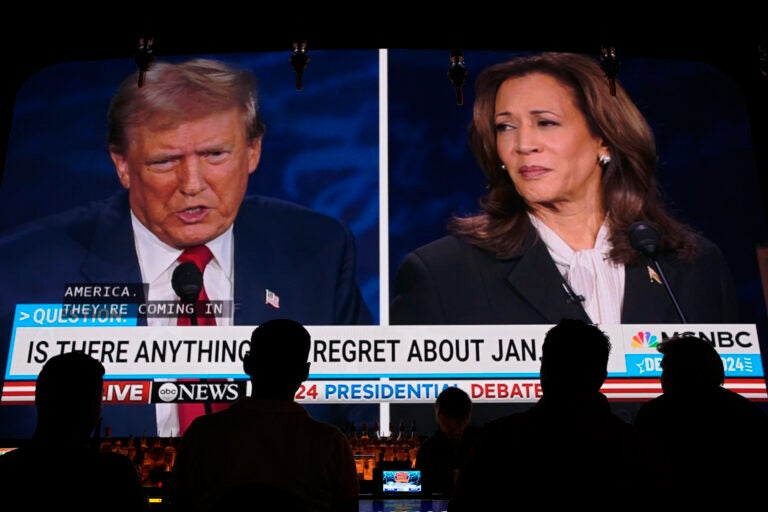
People watch the presidential debate between Republican presidential nominee former President Donald Trump and Democratic presidential nominee Vice President Kamala Harris, Tuesday, Sept. 10, 2024, at the Gipsy Las Vegas in Las Vegas. (AP Photo/John Locher)
At the debate in Philadelphia Tuesday, a moderator asked Vice President Kamala Harris and former President Donald Trump a question with implications for the future of public health, safety and the economy: What would they do to fight climate change if elected president?
Neither candidate directly answered the question.
Harris acknowledged the impact of climate change on Americans, saying, “it is very real.”
“Ask anyone who lives in a state who has experienced these extreme weather occurrences,” she said.
Harris talked about investments in clean energy under the current Biden administration, but stopped short of describing her own plan for tackling climate change if elected president.
Trump used his time responding to the question to attack the Biden-Harris administration’s record on manufacturing jobs. He promised to put tariffs on foreign-made cars “so they can’t come into our country,” but did not tie the issue back to reducing planet-warming emissions.
» READ MORE: Here’s what Harris and Trump said about climate change in the Philly debate
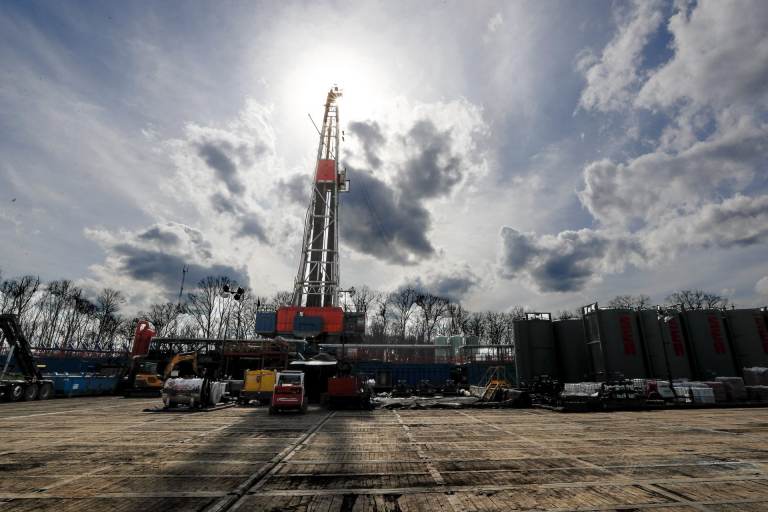
In this March 12, 2020, file photo, the sun shines through clouds in St. Mary's, Pa. (Keith Srakocic / AP Photo)
Fracking for natural gas in Pennsylvania took up significant airtime during the presidential debate Tuesday night at the National Constitution Center in Old City, especially when you consider how little influence a president has when it comes to drilling for oil and gas in the state.
In such a tight presidential race, Pennsylvania will be a hard-fought swing state. So, of course, we have to talk about fracking.
Former President Donald Trump is all for it, and at Tuesday’s debate, he claimed Vice President Kamala Harris is not.
“And she will never allow fracking in Pennsylvania. If she won the election, fracking in Pennsylvania will end on day one,” Trump said.
Harris, who favored a fracking ban when she first ran for president back in 2019, changed her position once she joined President Joe Biden as his vice-presidential running mate.
She reiterated her current position at Tuesday’s debate in response to a question about her shifting position on the issue.
“Let’s talk about fracking because we are here in Pennsylvania,” she said. “I made that very clear in 2020. I will not ban fracking. I have not banned fracking as vice president of the United States.”
» READ MORE: Fact check: A president can’t ban fracking in Pennsylvania
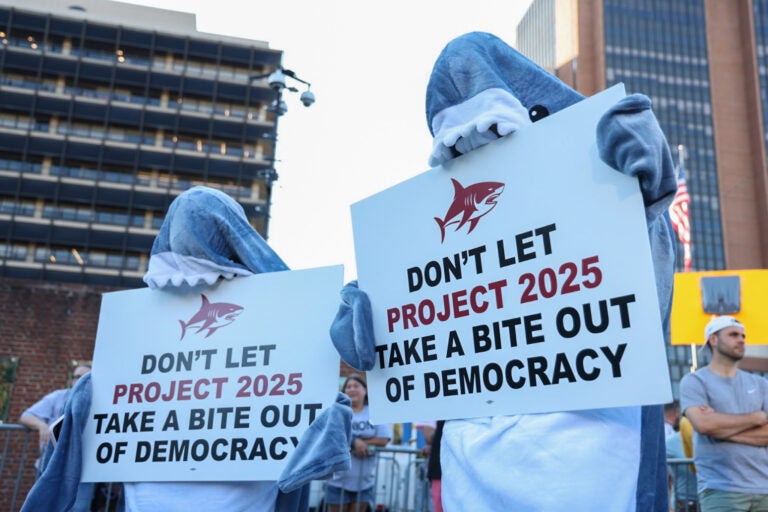
Protesters in shark attire called out presidential candidate Donald Trump’s involvement with Project 2025 outside Independence Mall in Philadelphia ahead of the debate between presidential candidates Trump and Harris on September 10, 2024. (Kimberly Paynter/WHYY)
On Tuesday, Philadelphia played host to the first presidential debate between Vice President Kamala Harris and former President Donald Trump.
While the Democratic and Republican candidates squared off at the National Constitution Center, demonstrators — a mix of Philly Palestine Coalition supporters, animal rights advocates, city workers and otherwise — gathered en masse for the occasion, and watch parties set up camp to watch the debate unfold in real-time.

» READ MORE: Photos from outside the Harris-Trump debate in Philadelphia
Cast out of office two years ago after being convicted of criminal corruption as Delaware state auditor, Kathy McGuiness attempted a comeback this year by running for a state House seat in her hometown, Rehoboth Beach.
McGuiness campaigned tirelessly against two opponents in the Democratic primary. She filled her Facebook page with photos of her smiling with voters, and had the backing of former House Speaker Pete Schwartzkopf, who has held the seat for 22 years.
But in Tuesday’s primary election, McGuiness finished a distant third.
Claire Snyder-Hall, who stepped down as head of the government accountability group Common Cause to run for the House, won with 41% of the nearly 3,600 votes cast.
Marty Rendon, 74, a former congressional aide who sits on the Delaware Human and Civil Rights Commission, finished second with 32%.
McGuiness, 57, a pharmacist and business owner who spent 16 years as an elected Rehoboth Beach town commissioner before she won the statewide race for auditor in 2018, only received 27% of the votes Tuesday.
» READ MORE: Convicted former Delaware state auditor Kathy McGuiness trounced in bid to win House seat
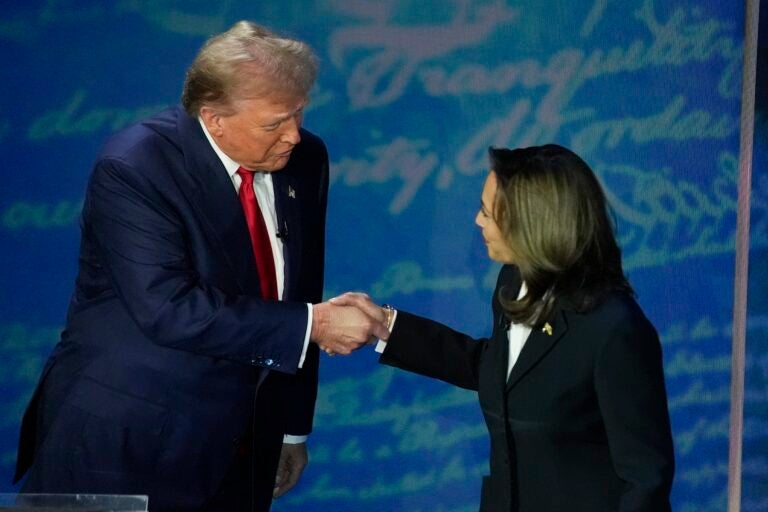
Republican presidential nominee former President Donald Trump and Democratic presidential nominee Vice President Kamala Harris shake hands before the start of an ABC News presidential debate at the National Constitution Center, Tuesday, Sept. 10, 2024, in Philadelphia. (AP Photo/Alex Brandon)
In their first and perhaps only debate, former President Donald Trump and Vice President Kamala Harris described the state of the country in distinctly different ways.
As the Democratic and Republican presidential candidates traded jabs, some old false and misleading claims emerged along with some new ones.
Here’s a look:
Trump overstates his economic record
TRUMP
“I created one of the greatest economies in the history of our country. … They’ve destroyed the economy.”
THE FACTS
This is an exaggeration. The economy grew much faster under Presidents Bill Clinton and Ronald Reagan than it did under Trump. The broadest measure of economic growth, gross domestic product, rose 4% a year for four straight years under Clinton. The fastest growth under Trump was 3% in 2018. The economy shrank 2.2% in 2020, at the end of Trump’s presidency. And a higher proportion of American adults had jobs under Clinton than under Trump. During the Biden-Harris administration, the economy expanded 5.8% in 2021, though much of that reflected a bounce-back from COVID.
Trump’s record on manufacturing jobs examined
HARRIS
“We have created over 800,000 manufacturing jobs. … Donald Trump said he was going to create manufacturing jobs. He lost manufacturing jobs.”
THE FACTS
Those statements are missing context.
There were 12,188,000 manufacturing employees in the U.S. when Biden took office in January 2021, according to the Bureau of Labor Statistics. Preliminary numbers for August 2024 put that number at 12,927,000. That’s a difference of 739,000 — close to the 800,000 number Harris has cited.
Also of note is the impact of the COVID-19 pandemic. The number of manufacturing employees dropped steeply in April 2020, by more than 1.3 million. Discounting that decline, there were only 206,000 more manufacturing employees in August than there were in March 2020, before the pandemic.
» READ MORE: A look at false and misleading claims made during Trump and Harris’ debate
Former President Donald Trump persisted Tuesday in saying during a nationally televised presidential debate that he had won the 2020 election and continued to take no responsibility for any of the mayhem that unfolded at the U.S. Capitol on Jan. 6, 2021, when his supporters stormed the building to block the peaceful transfer of power.
The comments underscored the Republican’s refusal, even four years later, to accept the reality of his defeat and his unwillingness to admit the extent to which his falsehoods about his election loss emboldened the mob that rushed the Capitol, resulting in violent clashes with law enforcement. It also made clear that Trump’s grievances about 2020 remain central to his campaign against his Democratic opponent, Vice President Kamala Harris, as he continues to profess allegiance to the rioters.
Asked twice if he regretted anything he did on Jan. 6, when he told his supporters to march to the Capitol and exhorted them to “fight like hell,” Trump at first responded by complaining that the questioner had failed to note that he had encouraged the crowd to behave “peacefully and patriotically” and by noting that one of his backers, Ashli Babbitt, was fatally shot inside the building by a Capitol Police officer.
He also suggested that protesters who committed crimes during the 2020 racial injustice protests were not prosecuted. But a 2021 Associated Press review of documents in more than 300 federal cases stemming from the protests sparked by George Floyd’s death found that more than 120 defendants across U.S. pleaded guilty or were convicted at trial of federal crimes including rioting, arson and conspiracy.
When the question about his actions on Jan. 6 arose again, he replied: “I had nothing to do with that other than they asked me to make a speech. I showed up for a speech.”
But he ignored other incendiary language he used throughout the speech, during which he urged the crowd to march to the Capitol, where Congress was meeting to certify President Joe Biden’s victory. Trump told the crowd: “If you don’t fight like hell, you’re not going to have a country anymore.” That’s after his lawyer, Rudy Giuliani, declared: “Let’s have trial by combat.”
» READ MORE: Trump repeats false claims over 2020 election loss, deflects responsibility for Jan. 6

The crowd at McGillin’s Olde Ale House watches the Presidential debate. (Emma Lee/WHYY)
Vice President Kamala Harris and Donald Trump debated a vast range of issues in their first and only scheduled debate of the general election.
In a rare show of unity, Pennsylvania voters — both Democrats and Republicans — appear to believe that Harris did better than they had expected.
Greg Coleman, a Harris supporter, started the evening feeling nervous. He understood the heavy significance of the debate on Harris’ still-young campaign, but came away far more confident in his candidate.
“It went, in my opinion, very well,” he said. “I think Harris did a great job at commanding the topic, but more importantly, she did a very good job at not being derailed,” he said at a Democratic watch party at McGillan’s tavern in Center City. Trump “is very good at throwing a competitor off base, and he did not succeed at that tonight,” he added.
» READ MORE: Republican, Democrat voters in Pennsylvania impressed, surprised by Harris’ debate performance
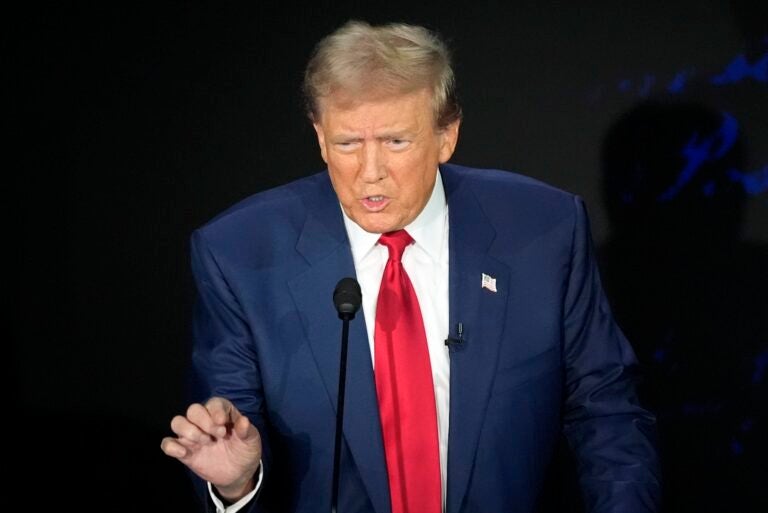
Republican presidential nominee former President Donald Trump speaks during a ABC News presidential debate with Democratic presidential nominee Vice President Kamala Harris at the National Constitution Center, Tuesday, Sept.10, 2024, in Philadelphia. (AP Photo/Alex Brandon)
This dispatch first appeared in NPR’s liveblog of the presidential debate between Kamala Harris and Donald Trump. See how the night unfolded.
It was understood that immigration would be front and center during Tuesday night’s presidential debate. More surprising was that the conversation veered into bizarre falsehoods about migrants eating pet dogs and cats in Ohio.
While certainly strange, these accusations are hardly unprecedented. In fact, there’s a long history of accusing immigrants of eating cats and dogs.
For context, in the last few days, vice presidential candidate JD Vance has echoed a rumor about Haitian migrants in Springfield, Ohio eating people’s pets. Springfield, a city of around 60,000, has received 15,000 to 20,000 migrants in the last four years, many from Haiti.
Mayor Rob Rue recently told NPR the influx has led to the city struggling with basic infrastructure. Schools and hospitals are spread thin, and an existing housing crisis has exacerbated. It’s led to tension, as well as unfounded rumors about gang activity, voodoo practices and eating of cats, dogs and park ducks.
The Springfield police has denied the claims.
And yet, tales of migrants eating pets spread throughout social media like wildfire. So did the memes and AI images of former President Donald Trump saving kittens and dogs in the hours leading up to the debate.
It even made it to the debate itself.
“They’re eating the dogs, the people that came in, they’re eating the cats,” Trump said during an answer to a question about immigration. “They’re eating the pets of the people that live there, and this is what’s happening in our country, and it’s a shame.”
Vice President Harris looked away and laughed at the comments while moderator David Muir stepped in, saying there have been no credible reports of pets being harmed by Springfield’s immigrant community.
But by the time the debate was over, THEY’RE EATING THE DOGS was trending on the platform X.
Fear and disgust over immigrant foods has a long history in America. Italians were once upon a time labeled as “garlic eaters”. Writer Gustavo Arellano has written about how the staple diet of beans led to a slur against Mexicans. The stereotype of the immigrant who eats cats and dogs is also storied, often lobbed against Asian Americans.
“The dog-eating stereotype has historically been utilized to belittle Asians and Asian immigrants,” writes Jean Rachel Bahk in the Inlandia literary journal. “I was incessantly pestered about whether the meat in the side dishes I brought for lunch was dog meat” she recalls about her own childhood.
“Despite my persistent attempts to explain that dog-eating was not at all a common practice among Asians not to mention Asian Americans I started to beg my mom to stop packing me Korean dishes.”
In recent speeches Trump has also likened immigrants to Hannibal Lecter, the cannibal in the film Silence of the Lambs. Ultimately, with both accusations there’s a point being made: these people are here to consume us, and what we love.
“I’ve seen them,” Springfield Republican committeewoman Glenda Bailey recently told NPR of Haitian migrants, echoing concepts of The Great Replacement theory. “What they’ve done is they’ve replaced the population in Springfield, Ohio.”
Following the debate, social media was rife with comments from people in disbelief that part of a presidential debate focused on pets being eaten by people. But it should not come as a shock: In the last few years the rhetoric on immigration from the Republican Party has been getting more vitriolic, according to a study from Stanford University.
The study used AI to chart the tone of more than 200,000 speeches since the 1880s, and found the hostile rhetoric in the way Republicans discuss immigration today is very reminiscent of that used against Chinese immigrants in the late 1800s, when they were targeted by the nation’s first country-based restrictions on immigration.
And at Tuesday night’s debate, they once again were broadcast to millions of Americans by the party’s candidate for president.
Dozens of students at a tiny liberal arts college in Delaware County continued a more than 20-year tradition of engaging the American political process: “Pizza and Politics.”
A little more than 20 miles away from the National Constitution Center in Philadelphia, Neumann University students watched the first — and possibly only — U.S. presidential debate between Vice President Kamala Harris and former President Donald Trump.
Unlocking Pennsylvania’s 19 electoral votes is crucial for any candidate. Reaching college-aged adults, a notoriously inactive voting bloc, might be the key to winning the Keystone State. Tuesday evening in Aston provided a snapshot into the critical demographic’s enthusiasm.
For many of these students, 2024 will be their first chance to cast their vote in a presidential election. The debate left many of the young suburban voters with mixed emotions.
» READ MORE: How the group of Neumann University students felt about the presidential candidates after the debate
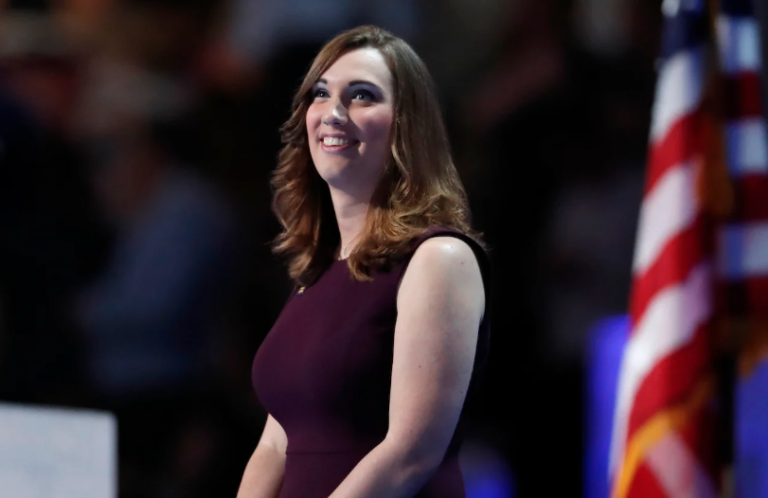
Delaware state Sen. Sarah McBride. (AP Photo/Paul Sancya, File)
Delaware’s Democratic and Republican primary voters have chosen who will represent their party in the governor’s race and a slew of other statewide and local contests in the Nov. 5 general election.
Among the standouts are Democratic state Sen. Sarah McBride winning the party’s primary election to become the Democratic nominee for the state’s seat in the United States House of Representatives. She will face Republican John J. Whalen III in November.
Also, Democratic New Castle County Executive Matt Meyer defeated Lt. Gov. Bethany Hall-Long and Collin O’Mara in the primary race for Delaware’s governor and will face Republican House Minority Leader Mike Ramone in the general election.
» READ MORE: A full list of who won in every primary race held Tuesday in Delaware.
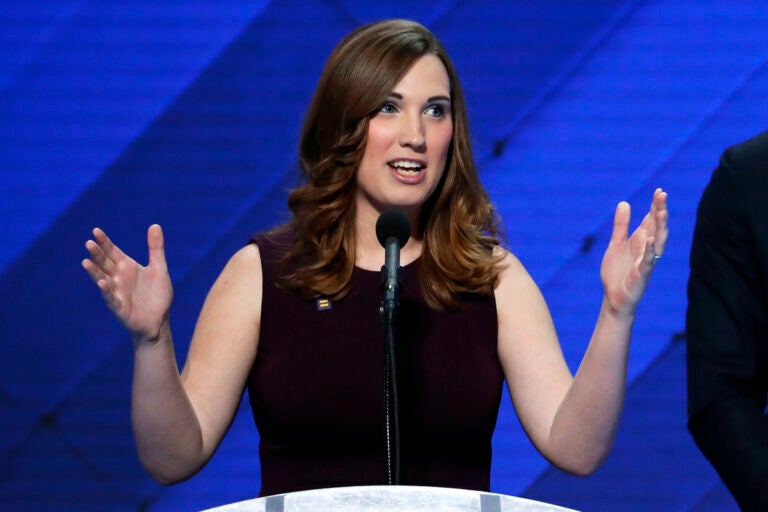
Sarah McBride speaks during the final day of the Democratic National Convention in Philadelphia, Thursday, July 28, 2016. (AP Photo/J. Scott Applewhite, File)
Delaware in November could elect the first openly transgender member of Congress and the state’s first Black U.S. senator.
On Tuesday, voters in the Blue Hen State were deciding their fall nominees in several political contests, including picking Matt Meyer, the chief executive of Delaware’s most populous county, in the Democratic primary for governor.
State Sen. Sarah McBride, meanwhile, won the Democratic primary for Delaware’s lone seat in the U.S. House of Representatives and now has the chance to make history as the first openly transgender person elected to Congress.
“My heart is filled with hope and gratitude,” McBride told The Associated Press. “I’m grateful, I’m hopeful and I’m motivated.”
McBride said Tuesday’s results reflect the “goodness” of Delawareans who judge a candidate “based on ability, not identity.”
“I’m not running to make history,” McBride said. “I’m running to make historic progress for Delawareans.”
“The only identity I want to be known for is my identity as a proud Delawarean,” she said, adding that she wasn’t saying her identity doesn’t matter. “It’s just one part of who I am.”
McBride won Tuesday’s primary over businessmen Earl Cooper and Elias Weir, neither of whom reported raising any money for their campaigns. Cooper is a political newcomer, while Weir finished dead last in a 2016 congressional primary with less than 1% of the vote.
McBride, meanwhile, raised almost $3 million in contributions from around the country. McBride achieved national recognition at the 2016 Democratic National Convention as the first openly transgender person to address a major party convention in the United States.
McBride will face James Whalen IIII, a retired state police officer and construction company owner from Millsboro, who won the GOP primary race against Donyale Hall, a Dover businesswoman and a Gulf War-era veteran of the U.S. Air Force. Democrats have held the seat since 2010.
The House seat is being vacated by Rep. Lisa Blunt Rochester, who has no primary opponent as she seeks the U.S. Senate seat being vacated by Democratic Sen. Tom Carper, who held the seat since 2001. With a victory in November Blunt Rochester would be the state’s first Black U.S. senator.
Meanwhile, in state legislative contests, Kamela Smith knocked off House Speaker Valerie Longhurst. Smith is director of community education and engagement for ChristianaCare, Delaware’s largest hospital system. On her campaign website she says she “believes in lifting up and speaking for the silenced, the marginalized, the voices of those vulnerable who don’t often get heard in Legislative Hall.”
» READ MORE: Delaware Democrats back Sarah McBride’s bid to become first openly transgender person in U.S. Congress

Republican presidential nominee former President Donald Trump and Democratic presidential nominee Vice President Kamala Harris shake hands before the start of an ABC News presidential debate at the National Constitution Center, Tuesday, Sept. 10, 2024, in Philadelphia. (AP Photo/Alex Brandon)
Donald Trump and Kamala Harris faced each other on the debate stage Tuesday night for the first — and possibly the last — time.
The Democratic vice president opened the faceoff with a power move, marching across the stage to Trump’s lectern to shake his hand. Harris controlled the conversation at times, baiting Trump with jabs at his economic policy, his refusal to concede his 2020 election loss and even his performance at his rallies.
Trump was often on defense, but he did drive the core message of his campaign: Inflation and immigration are hammering Americans. He even amplified false rumors that Haitian immigrants in Ohio are eating pets — ABC’s David Muir noted that local officials say that is not happening — as he argued that the Biden-Harris administration was admitting dangerous immigrants.
And one significant moment played out after the two candidates left the stage, when megastar Taylor Swift said she’ll vote for Harris.
» READ MORE: Key takeaways from the Harris-Trump debate in Philadelphia
This dispatch originslly appeared on NPR.
Taylor Swift has waded into the election discourse with a highly awaited political endorsement.
The influential superstar threw her support behind Harris in a post on Instagram within minutes of the debate ending.
The photo? A picture of Swift posing with one of her three cats. The signoff? “Taylor Swift, Childless Cat Lady” — a reference to a disparaging comment made by Republican vice presidential candidate J.D. Vance earlier this year, which many Democratic women have since reclaimed.
Swift wrote that she had watched the debate and done her research on each candidates’ proposals for the country. She said she was alarmed by Trump posting recent AI pictures falsely showing her endorsing him, and wanted to combat misinformation with the truth: She will be voting for the Harris-Walz ticket.
“I’m voting for @kamalaharris because she fights for the rights and causes I believe need a warrior to champion them,” Swift wrote. “I think she is a steady-handed, gifted leader and I believe we can accomplish so much more in this country if we are led by calm and not chaos. I was so heartened and impressed by her selection of running mate @timwalz, who has been standing up for LGBTQ+ rights, IVF, and a woman’s right to her own body for decades.”
Swift encouraged other voters to do their research and make their own decision. And she reminded first-time voters to register, promising to link information about registration and early voting in her Instagram story — which she did.
View this post on Instagram
» READ MORE:
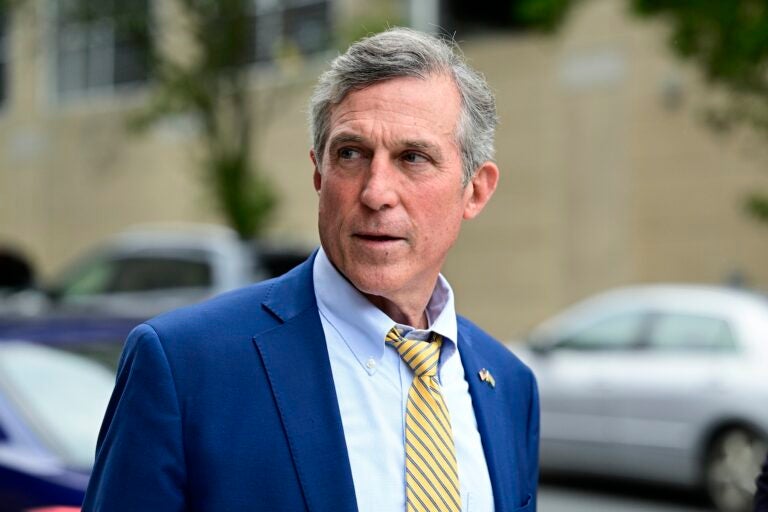
Delaware Gov. John Carney exits Vice President Kamala Harris campaign headquarters, July 22, 2024, in Wilmington, Del., after Harris addressed staff members. (AP Photo/Derik Hamilton, File)
Delaware Gov. John Carney will be the next mayor of Wilmington, the state’s largest city. He captured more than 53% of the vote over former state Treasurer Velda Jones-Potter with all precincts reporting.
Because there is no Republican candidate in November’s general election, Carney is the de facto mayor-elect, replacing outgoing Mayor Mike Purzycki, who decided not to run for re-election.
Carney said in a victory speech to staff and supporters that his campaign probably knocked on more than 10,000 doors during the campaign.
“But at the end of the day, it’s that individual family living on a block somewhere across the city that we work for to make sure that their life is better, that they enjoy Wilmington more than ever,” he said.
Jones-Potter was appointed state treasurer in 2009 and served about two years before losing her bid for a full term. She said she was discouraged with the result.
“It’s disappointing that we as a city are still looking at more of the same,” she said, “that we are not going to see people in our city have the kind of opportunity that they should.”
» READ MORE: Delaware Gov. John Carney becomes Wilmington’s next mayor
This dispatch originally appeared on NPR.
Vice President Harris repeatedly leaned into her middle class roots at the debate, seeking to contrast her childhood as the daughter of immigrants to former President Donald Trump’s experience being born into a wealthy family.
Harris opened the debate underscoring that contrast as she answered a question about whether Americans are better off now than they were four years ago, saying Trump wants to pay for tax cuts for billionaires on “the backs of middle class people.”
“I was raised as a middle class kid, and I am actually the only person on this stage who has a plan that is about lifting up the middle class and working people of America,” she said. “My opponent, on the other hand, his plan is to do what he has done before, which is to provide a tax cut for billionaires and big corporations.”
Harris went on to attack Trump’s economic plans — including his call for steep tariffs on most foreign imports as a “20% tax on everyday goods that you rely on to get through the month,” that would result in families paying $4,000 more a year.
Later, when asked about why some of her policy positions have changed — including on fracking, Harris said she would not ban the drilling technique. Then, she pivoted back to the theme of growing up middle class — saying her values have not changed.
“As it relates to my values, let me tell you, I grew up a middle class kid raised by a hard working mom who worked and saved and was able to buy our first home when I was a teenager,” she said, then attacked Trump. “The values I bring to the importance of homeownership, knowing not everybody got handed $400 million on a silver platter and then filed bankruptcy six times.”
Trump responded that he hadn’t been given $400 million, but “a tiny fraction” of that, which he said he built into “many, many billions of dollars.”
This dispatch originally appeared on NPR.
Trump says the Israel-Hamas and Russia-Ukraine wars would not have happened if he were president.
That’s one of his favorite refrains: He’s repeatedly insisted those conflicts are related to President Biden’s election, and vowed that he would resolve them quickly if re-elected.
He has said he could end the war in Ukraine within 24 hours, but declined to elaborate how. He told Fox’s Sean Hannity last year that it would be a “very easy negotiation,” but didn’t want to show his hand.
Chris Stirewalt, a senior fellow at the American Enterprise Institute, told NPR earlier this year that Trump makes complex foreign policy sound simple, and people believe him.
“The authoritarian tendency in politics, not just in the United States but anywhere, is to say that there is a simple and easy answer,” Stirewalt said. “But the bad people will not let you obtain it because they’re weak — or they’re corrupt.”
READ MORE: The facts behind Trump’s talking points
This dispatch originally appeared on NPR.
It is illegal for noncitizens to vote in federal elections and there is no credible evidence that it has happened in significant numbers, or that there is an effort underway to illegally register undocumented immigrants to vote this election.
Voter registration forms require voters to sign an oath — under penalty of perjury — that they are U.S. citizens. If a noncitizen lies about their citizenship on a registration form and vote, they have created a paper trail of a crime that is punishable with jail time and deportation.
“The deterrent is incredibly strong,” David Becker, executive director of Center for Election Innovation and Research, told NPR.
Election officials routinely verify information on voter registration forms, which ask registrants for either a driver’s license number or the last four of social security numbers.
In 2016, the Brennan Center for Justice surveyed local election officials in 42 jurisdictions with high immigrant populations and found 30 cases of suspected noncitizens voting out of 23.5 million votes cast, or 0.0001%. Georgia Secretary of State Brad Raffensperger launched an audit in 2022 that found fewer than 1,700 suspected noncitizens had attempted to register to vote over the past 25 years. None were able to vote.

In this March 12, 2020, file photo, the sun shines through clouds in St. Mary's, Pa. (Keith Srakocic / AP Photo)
Former President Donald Trump attacked Vice President Kamala Harris on her position on hydraulic fracturing — popularly known as “fracking.” Fracking has been a highly debated topic in Pennsylvania for years.
Harris proposed a fracking ban in 2019 when she first ran for president. However, she changed course when she joined Joe Biden’s administration as his vice president, and now says she supports fracking.
That position puts her in line with other Democratic leadership in Pennsylvania, including Gov. Josh Shapiro and Sens. John Fetterman and Bob Casey.
However, Trump argued in the debate that Harris is now lying about her position.
“If she won the election, fracking in Pennsylvania will end on Day 1,” he said.
“I will not ban fracking. I have not banned fracking as vice president of the United States,” Harris responded, adding that she wants to “invest in diverse sources of energy.”
Fracking advocates say that fracking has helped the United States achieve energy independence and has created thousands of jobs in the commonwealth. Fracking is also believed to be responsible for cases of asthma and lymphoma, and for poisoning the environment around wells.
This dispatch originally appeared on NPR.
Republicans have long called Harris a “border czar.” Those claims got louder when Harris was tapped as presidential candidate. It is false: in 2021, President Biden tasked Harris with finding out the root causes of migration. (At the time, migrants were predominantly Central American.)
This dispatch originally appeared on NPR.
There was a lot of chaos during the early months of the COVID-19 pandemic in the Trump administration. The national stockpile of key goods like masks were depleted, and Trump made moves to have the U.S. leave the World Health Organization. Trump regularly contradicted his health experts, and his political allies were found to have interfered with guidelines from the Centers for Disease Control and Prevention on how to limit the spread at a time when there was very little data on the virus and how it spread.
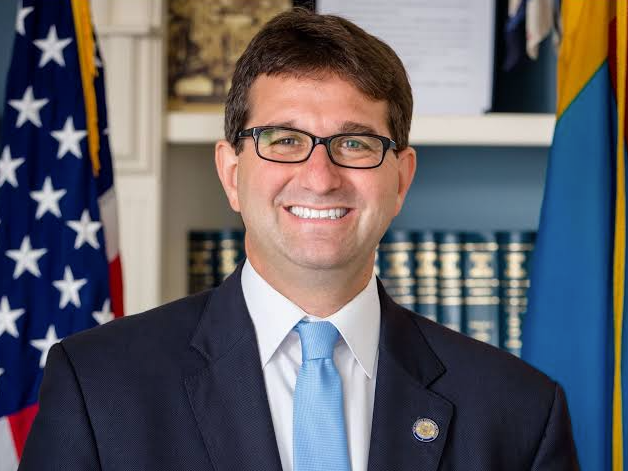
Matt Meyer, who won the Democratic primary for governor of Delaware Sept. 10. (Courtesy of the Meyer campaign)
New Castle County Executive Meyer capitalized on Lt. Gov. Bethany Hall-Long’s yearlong campaign finance scandal and former state environmental protection chief Collin O’Mara’s late entrance into the race and rolled to a convincing victory Tuesday in the three-way gubernatorial primary.
Meyer, whose candidacy was fueled by a huge fund-raising advantage, was declared the winner by the Associated Press shortly after 9 p.m. With 348 of 530 districts reporting results, Meyer held 48% of the vote in the marquee race of the Delaware primary season. Hall-Long was in second with 36% and first-time candidate O’Mara was third with about 16%.
Meyer, 52, will face state House Minority Leader Mike Ramone in the Nov. 5 general election to succeed Carney, who by law could not seek a third term.
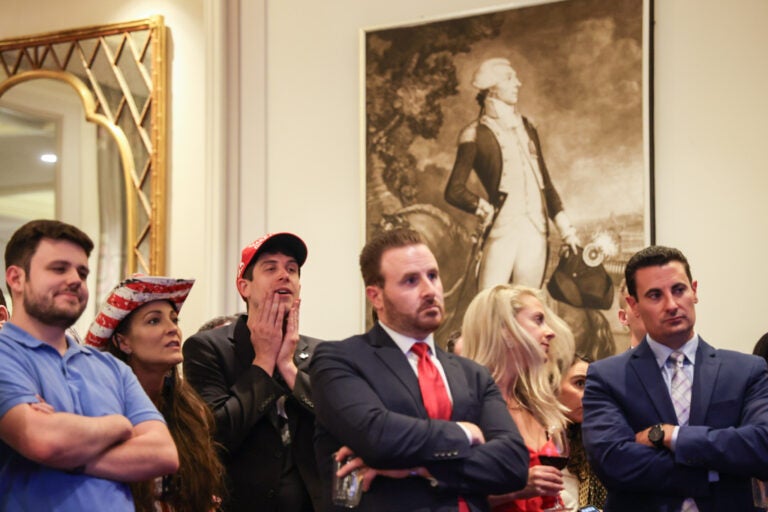
Philadelphia Young Republicans watched the presidential debate at the Kimpton Hotel on Sept. 10, 2024. (Kimberly Paynter/WHYY)
Around 100 people gathered in the Lafayette South Room of the Kimpton Hotel Monaco for the Philadelphia Young Republicans’ watch party for the U.S. presidential election between former President Donald Trump and current Vice President Kamala Harris.
The location was within walking distance of the National Constitution Center, where the debate was occurring. Senate candidates Dr. Mehmet Oz, Jeff Bartoz and George Bochetto, as well as state Reps. Torren Ecker and Thomas Kutz, attended the event.
“The debate is right up the street from Independence Hall, we’re right across the street. I mean, you couldn’t ask for much more,” said Matt Lamorgese, chairman of the Philadelphia Young Republicans.
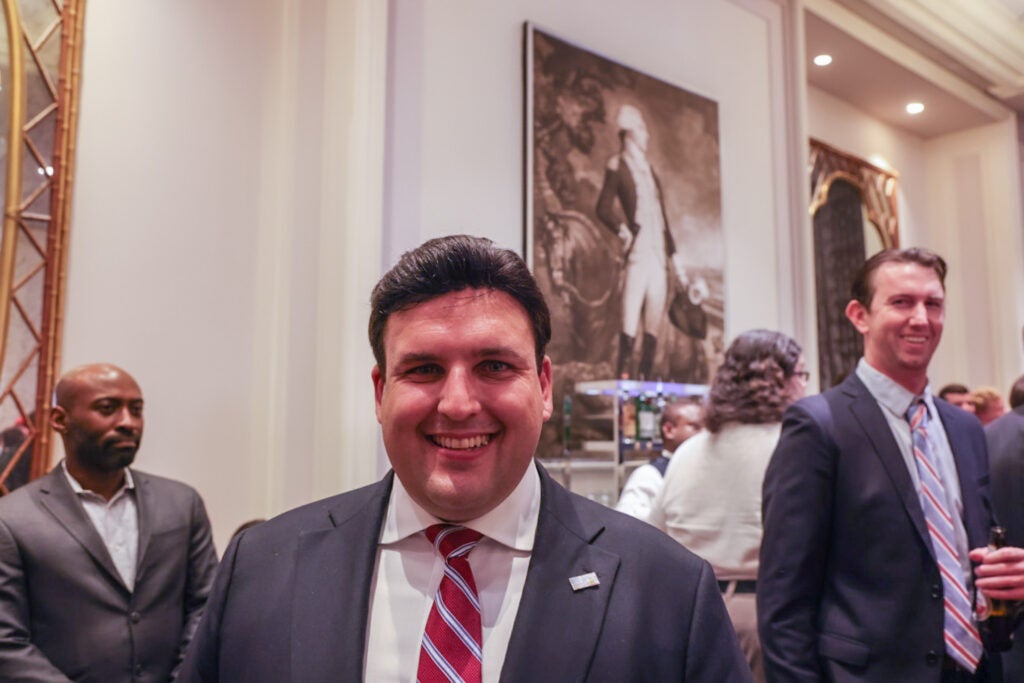
Jeff Howlett came all the way from Norfolk, Virginia, for the watch party and to see the Fox Nation lineup, which included former Rep. Jason Chaffetz, Pete Hegseth, Rachel Campos-Duffy and Brian Brenberg.
“I hope Trump can hold his composure and not fall for the bait,” Howlett said before the debate started. “I really want to hear what Harris has to say, because she’s been hiding.”
During the debate, boos and groans were heard when Harris spoke along with shouts of “liar” and “shut up.” An audible groan filled the room as soon as Harris brought up Project 2025. Some boos were directed at the moderators when they fact-checked Trump on issues like abortion.
The only moment of cheering for Harris came when she suggested people should attend one of Trump’s rallies — though she said it was to see how people leave them early.
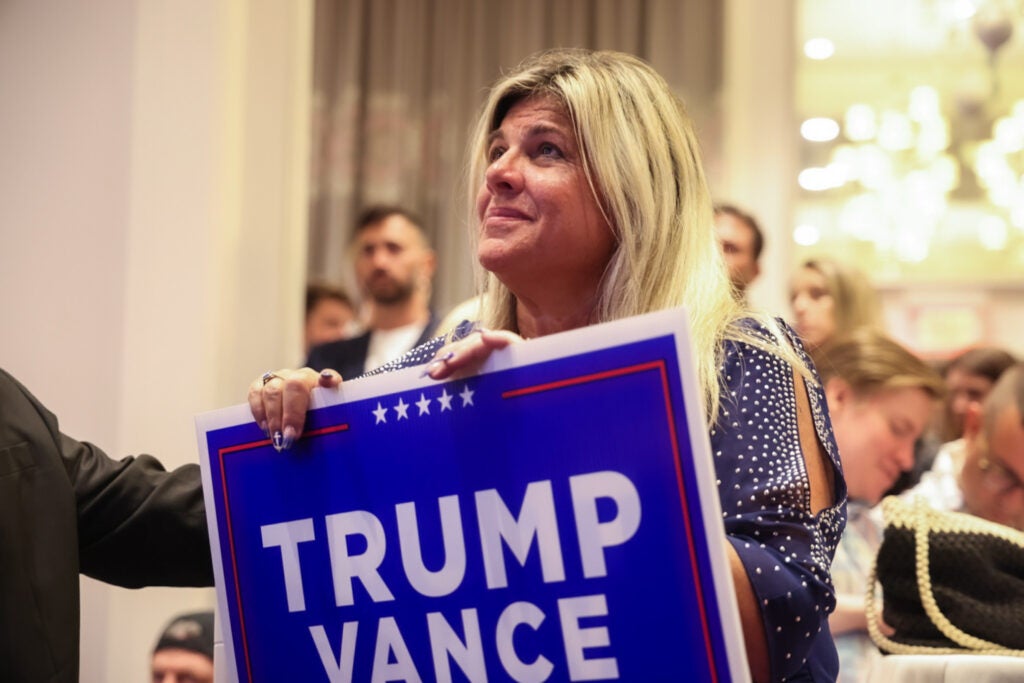
The whole room cheered and applauded for Trump after each of his answers.
“I think Donald Trump is presenting his case to the country,” Lamorgese said during the debate. “I think he’s highlighting the issues that are on Americans’ minds, rather than using baseless attacks and smears.”
This dispatch originally appeared on NPR.
In a statement that drew a fact check from the moderator, Trump falsely claimed that a former West Virginia governor had called for “executing” babies after birth. Trump apparently intended to refer — also inaccurately — to a statement by former Virginia Gov. Ralph Northam, who is also a pediatric neurologist.
Northam faced controversy in 2019 over his response to a question about how to care for an infant born with fatal complications.
Trump later repeated the false claim that abortions take place “after birth.”
As ABC News anchor Linsey Davis mentioned during her real-time fact check, there is no state where it is legal to kill a baby after birth. A report from KFF earlier this year also noted that abortions “after birth” are illegal in every state.
According to the Pew Research Center, the overwhelming majority of abortions — 93% — take place during the first trimester. Pew says 1% take place after 21 weeks. Most of those take place before 24 weeks, the approximate timeline for fetal viability, according to a report by KFF Health News.
An analysis from KFF earlier this year noted that later abortions are expensive to obtain and offered by relatively few providers, and often occur because of medical complications or because patients face barriers earlier in their pregnancies.
“Nowhere in America is a woman carrying a pregnancy to term and asking for an abortion. That isn’t happening; it’s insulting to the women of America,” Harris said.
Harris also invoked religion in her response, arguing that “one does not have to abandon their faith” to agree that the government should not control reproductive health decisions.
As Davis also noted, Trump has offered mixed messages about abortion over the course of the campaign. He has bragged about his instrumental role in overturning Roe v. Wade, while appearing to backpedal on an issue that polling makes clear is a liability for Republicans.
This dispatch originally appeared on NPR.
Harris quickly attacked Trump on his association with the architects of Project 2025.
“I’m going to tell you on this debate tonight, you’re going to hear from the same old tired playbook, a bunch of lies, grievances and name-calling,” Harris said in the first few minutes of the debate. “What you’re going to hear tonight is a detailed and dangerous plan called Project 2025 that the former president intends on implementing if he were elected to again.”
Trump found himself again seeking to defend and distance himself from Project 2025, the controversial plan drafted by the Heritage Foundation to overhaul the U.S. government.
“Number one, I have nothing to do — as you know and as she knows better than anyone — I have nothing to do with Project 2025,” he said. “That’s out there. I haven’t read it. I don’t want to read it purposely. I’m not going to read it.”
For weeks, Trump has been dogged by his relationship to those who drafted the 900-page pro-Trump plan that calls for mass deportations, eliminating the Department of Education, imposing stricter controls on abortion and slashing climate protections.
Democrats have repeatedly sought to tie Trump to the most controversial aspects of the plans.
Allies got involved. Actress Taraji Henson brought it up at the BET awards, really added fuel to the fire.
It was also a big part of the Democratic National Convention, with comedian Kenan Thompson carrying out a cartoon-size version of Project 2025 to make fun of Trump and the effort.
It is true that the Trump campaign did not draft Project 2025. But those involved in the policy proposals include loyalists and allies of Trump, and former Trump officials.
These officials are likely to be candidates in a second Trump administration.
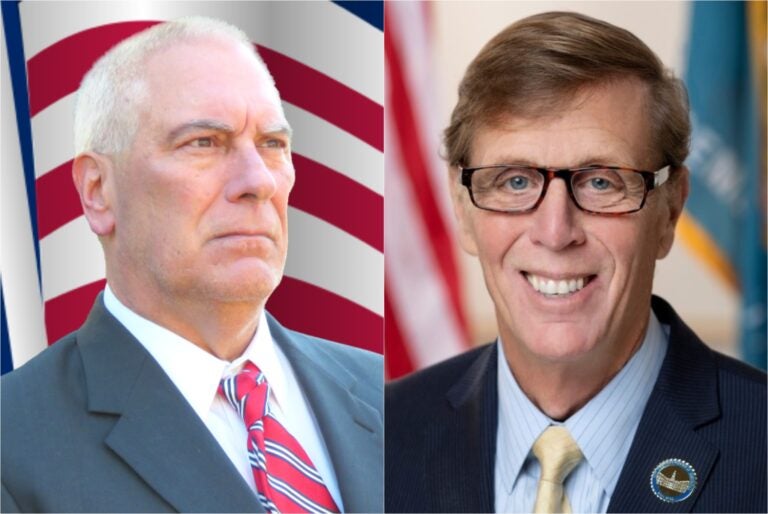
Former cop Jerry Price (left) will face House Minority Leader Mike Ramone in the Delaware Republican gubernatorial primary. (Courtesy of Jerry Price/State of Delaware)
Delaware state Rep. Mike Ramone will face off against the winner of the Democratic primary for Governor.
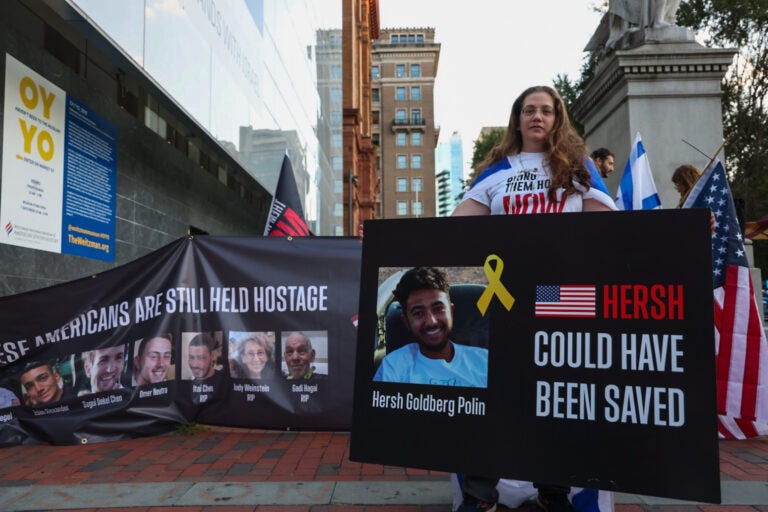
Talia Reiner Brodetzki, called on the U.S. government to bring Israeli hostages home outside the Jewish History Museum in Philadelphia ahead of the debate between presidential candidates Trump and Harris on September 10, 2024. (Kimberly Paynter/WHYY)
Release of hostages a ‘bipartisan issue’
A crowd of people representing different causes gathered not far from the Liberty Bell on Tuesday ahead of the Presidential debate between former President Donald Trump and current Vice President Kamala Harris at the National Constitution Center.
Tali Reiner Brodetski, part of the Hope for Israel Alliance, held up signs supporting the Israeli hostages who were taken as part of the Oct. 7 surprise attack by the militant group Hamas, and either remain in captivity or have died in Hamas’ custody. She said the release of the hostages was a “bipartisan issue.”
“We have to put humanity at the forefront,” she said. “These are people’s lives that are at stake. They are dying. They are suffering and everybody needs to do as much as they can to get them out.”
RFK Jr. supporter finds new home
Alix Paul, who backed Robert Kennedy Jr.’s now-suspended presidential campaign in Bucks County, said she was there to support unity between Trump and Kennedy.
She said she was disappointed initially that Kennedy wouldn’t be on the ballot in November, “but that sadness quickly turned into happiness when I saw the rally appearance of Robert F. Kennedy Jr. at Trump’s rally and how amazing the crowd was towards him, how amazing that moment was, and I quickly knew that this is exactly where we’re supposed to be.”
Paul said that she feels Trump and Kennedy are aligned on many issues, such as free speech, the border, inflation and health care. She would like to see Trump’s environmental policies align more with Kennedy’s views.
City workers leverage attention to raise Philly issues
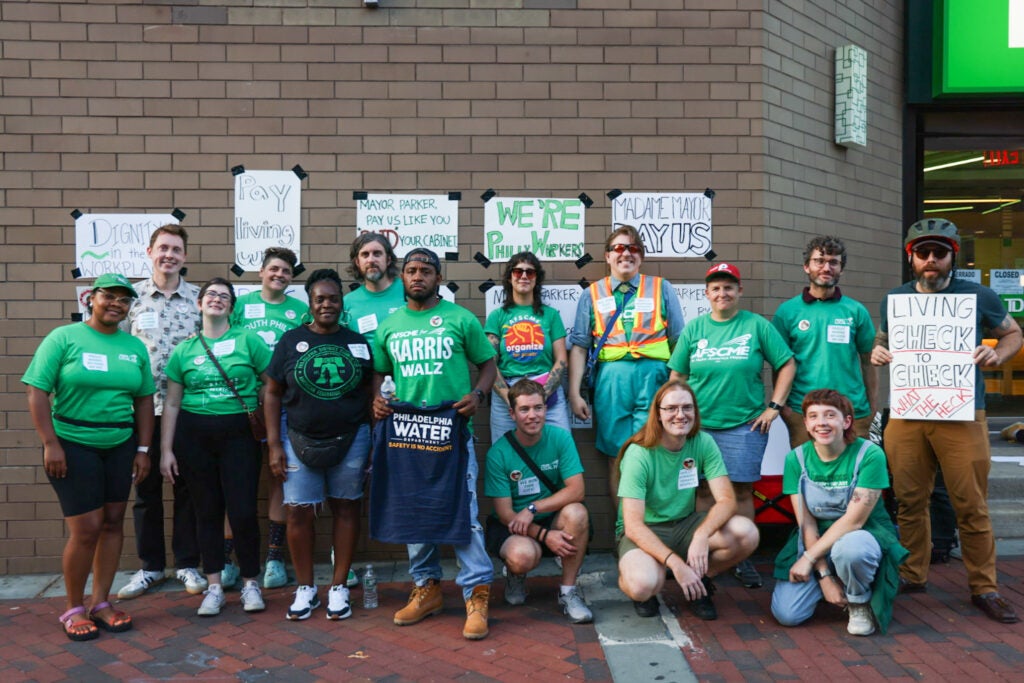
Some Philadelphia city workers protested on the corner of Fourth and Market streets. The group, made up of municipal and cultural workers, wasn’t there to protest or support a presidential candidate or issue, though. Instead, they were using the attention of the debate to protest Mayor Parker’s administration.
“We’re here today because all eyes are on Philadelphia today. There’s a huge debate and Mayor Parker … wants to show the world that Philadelphia is a great place to live and work, but we want people to know that as Philadelphia city workers, we’re having a hard time,” said Kate Goodman. “We’re struggling at work, we’re fighting for a better contract, and she’s been mistreating us.”
The protest comes four days after the city announced a one-year contract extension with AFSCME District Council 47, which includes librarians, social workers, supervisors and other city employees. The extension included a 4.4% salary increase, one-time bonuses of $1,400 and an $850,000 contribution to the union’s Health and Welfare Fund.

Sarah McBride speaks during the final day of the Democratic National Convention in Philadelphia, Thursday, July 28, 2016. (AP Photo/J. Scott Applewhite, File)
McBride won the Democratic primary for Delaware’s lone seat in the U.S. House of Representatives.
McBride won Tuesday’s primary over businessmen Earl Cooper and Elias Weir, neither of whom reported raising any money for their campaigns. Cooper is a political newcomer, while Weir finished dead last in a 2016 congressional primary with less than 1% of the vote.
McBride, meanwhile, raised almost $3 million in contributions from around the country. McBride achieved national recognition at the 2016 Democratic National Convention as the first openly transgender person to address a major party convention in the United States.
McBride will go up against either Donyale Hall, a Dover businesswoman and a Gulf War-era veteran of the U.S. Air Force, or James Whalen IIII, a retired state police officer and construction company owner from Millsboro, who are facing off in the GOP primary. Democrats have held the seat since 2010.
The House seat is being vacated by Rep. Lisa Blunt Rochester, who has no primary opponent as she seeks the U.S. Senate seat being vacated by Democratic Sen. Tom Carper, who held the seat since 2001. With a victory in November Blunt Rochester could become one of only two Black women in the Senate next year, joining Angela Alsobrooks of neighboring Maryland if she is also victorious in her campaign.
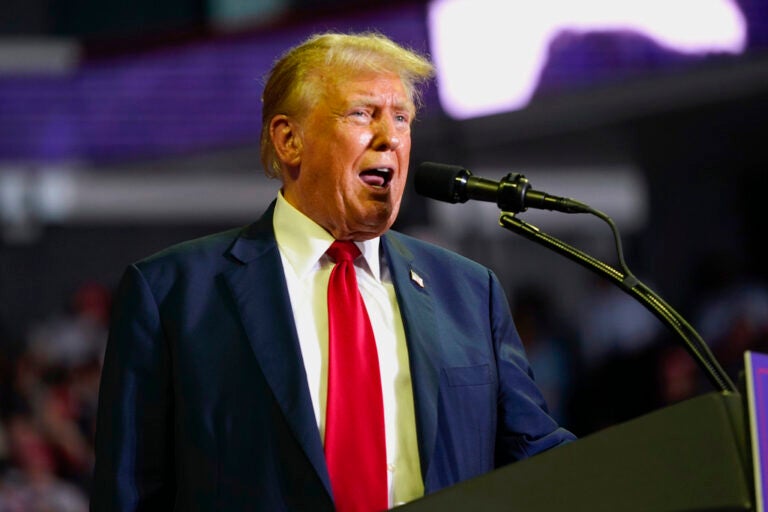
Republican presidential candidate former President Donald Trump speaks at a campaign rally, June 22, 2024, at Temple University in Philadelphia. (AP Photo/Chris Szagola, File)
The last time Trump faced off against a woman on the presidential debate stage, he uttered a sexist insult that itself became a rallying cry among many feminists.
“Such a nasty woman,” he interjected — one of dozens of such interruptions — as Hillary Clinton was speaking during their third debate.
At the debate before that, he physically loomed behind Clinton as she delivered her answers, an apparent attempt at intimidation that she later said had made her skin crawl.
Trump prides himself on being a tough negotiator, but often appears flummoxed when facing a powerful woman, as NPR’s Franco Ordoñez explains.
“Trump built his image as an alpha male who bullies and emasculates male opponents,” he says. “He takes a slightly different approach with female opponents, belittling their intelligence and criticizing their appearance.”
Trump has called Nancy Pelosi “unhinged,” called for Liz Cheney to be jailed and nicknamed Nikki Haley, his then-primary opponent, “bird brain.”
His habit of insulting women takes on loaded meaning given the historic power imbalances between men and women — and the gender gap in this particular election. Harris has a huge lead over Trump among women, while Trump leads among men.
Karoline Leavitt, the national press secretary for Trump’s campaign, dismissed the idea that the former president struggles with strong women, saying “that’s comical and false.”
She pointed to the women Trump appointed to leadership positions in his administration, like then-press secretary Sarah Huckabee Sanders and former senior counselor Kellyanne Conway, who similarly praised Trump for elevating women in her speech at the Republican National Convention.
Republican strategist Doug Heye told NPR’s Morning Edition on Tuesday that women are going to pay attention to how Trump treats Harris onstage.
His microphone will be muted while she is speaking, in accordance with the new rules, but there’s always a risk he could slip into personal attacks.
“Don’t call your opponent dumb or stupid or any of those things that Donald Trump likes to do,” Heye advised him.
“One, you’re lowering the bar for Harris’ expectations for the debate. Two, you run the risk of women reacting extremely negatively to this, and the Harris campaign is poised to use that coming out of this debate. Focus on the issues, stay off the personal.”

Pro-Palestinian protesters march on Market Street before the presidential debate. (Heather Chin/WHYY)
Pro-Palestinian protesters marched in Center City ahead of tonight’s presidential debate between Vice President Kamala Harris and Donald Trump.
The large crowd wielded signs reading “There is no debating genocide” and “No cease fire no vote” as they marched in downtown Philadelphia Tuesday evening.
The war in Gaza has continued to spur large protests across the country as supporters on both sides have looked to make their voices heard amid the bloodshed.
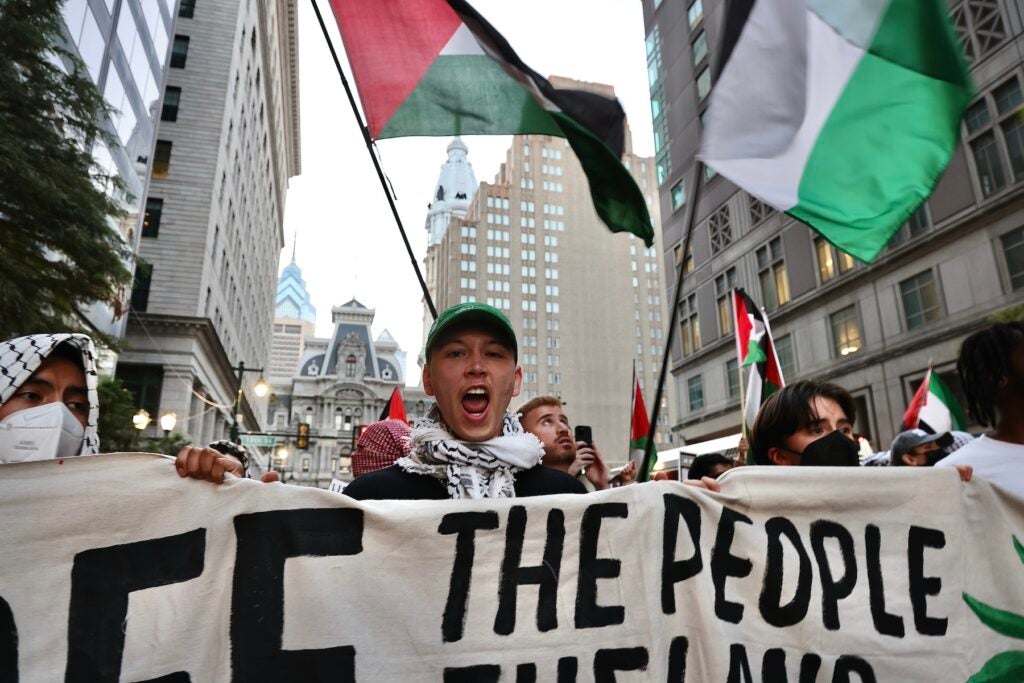
Bisan Ahmed, an organizer with the Philly Palestine Coalition, urged protesters not to vote for either Harris or Trump in November, saying neither has acted on behalf of Palestinians, nor people of color, generally.
“In November, we’ll remember,” she said over a loudspeaker.
As they marched downtown, people chanted “From Philly to Palestine, all our circles intertwine.”
The war will look to be a hot button issue during the debate as, while opinions have shifted slightly on Israel’s response to Hamas-led militant groups’ surprise attack on the country on Oct. 7., polls continue to show that a majority of Americans disapprove of Israel’s handling of the conflict.
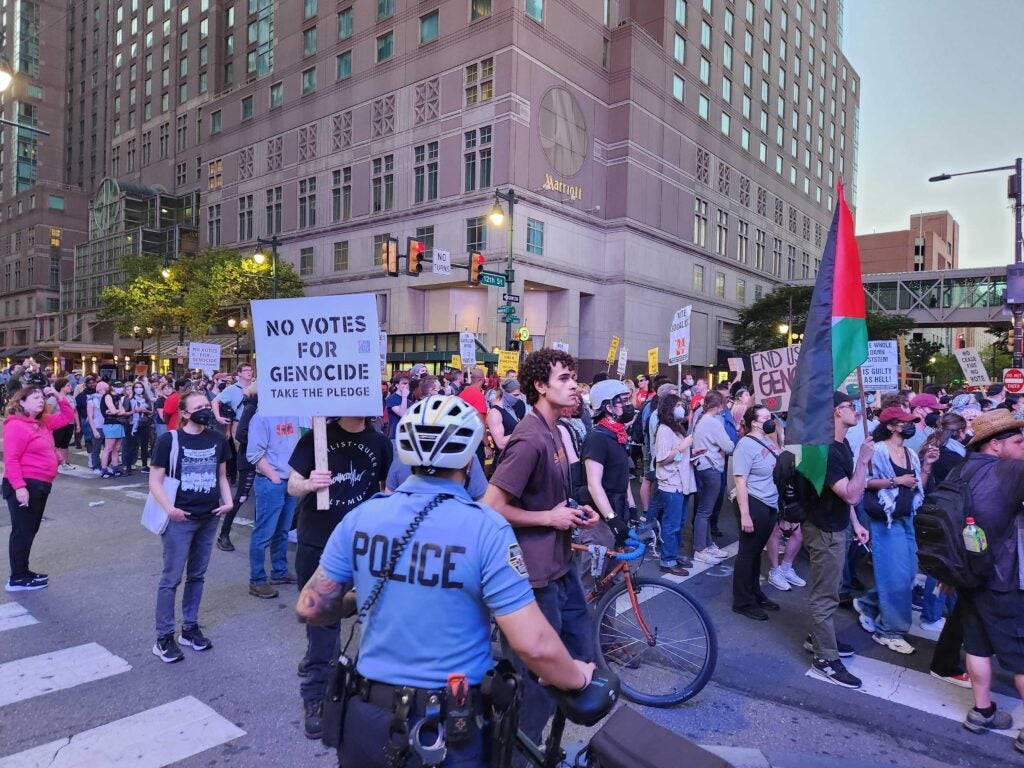
Editor’s note: WHYY’s Peter Crimmins and Heather Chin helped contribute to this report.
Polls have closed in Delaware’s 2024 primary election.
Voters weighed in on contested primaries for both the Democratic and Republican nominations for governor, as six candidates — Lt. Gov. Bethany Hall-Long, New Castle County Executive Matt Meyer, former state Natural Resources Secretary Collin O’Mara, retired police officer Jerry Price, state House Minority Leader Michael Ramone and small business owner Bobby Williamson — are vying to replace outgoing Gov. John Carney.
Carney, meanwhile, is competing against former statewide officeholder Velda Jones-Potter to become Wilmington’s next mayor.
Follow along as WHYY News tracks primary election results this evening.
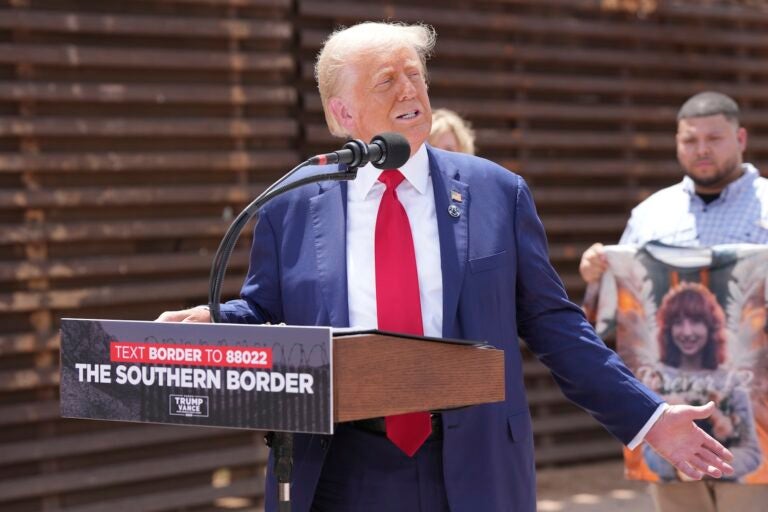
Former President Donald Trump speaks during a campaign event in front of the US-Mexico border, Thursday, Aug 22, 2024, in Sierra Vista, Arizona. (AP Photo/Rick Scuteri)
In preparation for tonight’s debate, Weekend Edition Saturday host Scott Simon spokes to three foreign correspondents about some of the global issues they’ll be listening for.
They shared which hot-button topics they expect the candidates to cover, and what they wish would get more attention on the debate stage.
Listen to the full roundtable here, and read on for highlights:
Eyder Peralta, Mexico City
In the last debate — between Trump and Biden — Latin America came up only in the context of immigration and drug trafficking, and Peralta expects it will be the same this time around.
“We’ll hear a fairly shallow debate that focuses on immigration enforcement — who’s tough, who’s not tough,” he says. “But I bet what we won’t hear is a discussion of root causes. And the reason so many people are on the move here in this hemisphere is because, in many ways, Latin America is on fire.”
He points to all-out chaos in Haiti, a political crisis in Venezuela, a collapsed economy in Cuba, Nicaragua’s banishing of its opponents and the rise of an authoritarian leader in El Salvador.
“Like in Europe, the post-Cold-War order is shifting, and it’s causing chaos, and migration is just a symptom,” he adds. “I would like to hear a diagnosis from former President Trump and Vice President Harris.”
Aya Batrawy, the Middle East
The biggest issue in the region is the war between Israel and Hamas unfolding in Gaza. Batrawy notes that many Israelis see a partner and friend in President Biden, and that Harris has echoed that support.
But Trump is also seen as a staunch ally of Israel, having moved the U.S. embassy from Tel Aviv to Jerusalem and recognized the Golan Heights as Israeli territory.
“When you look at what the Arab countries view, what the Middle Eastern countries view, like the Egypt or the Gulf countries, there are some differences in policies. But overall, especially when you ask the Palestinians, they see more of the same, which is staunch, unequivocal support for Israel,” she adds.
The nearly year-long conflict has spilled over into the Gulf region, where Batrawy is based. There are concerns about Houthi attacks on ships in the Red Sea and possible retaliation by Iran against Israel, for example.
“No one has control over the levers of where this is headed, and we still don’t see a cease-fire happening, and so things can really, really deteriorate quickly, whether that’s before the elections or after,” Batrawy says.
John Ruwitch, China
Beijing is watching the election in the context of the broader U.S.-China relationship, which has been increasingly competitive in recent years.
“To the extent that China comes up in the debate, it seems pretty likely that it’ll be in a sort of muscle-flexing, almost chest-thumping type of way,” Ruwitch says.
The candidates seem to differ on China policy. Trump, for example, has talked about imposing sweeping tariffs on Chinese goods, while Harris’ seems to be pretty consistent with the Biden administration’s. Trump has questioned why the U.S. would help Taiwan defend itself. Harris’ position is less known, though Biden has explicitly said the U.S. would help defend Taiwan in the event of an attack by China.
“Either way, Beijing is planning for all kinds of possible post-election scenarios, the least likely of which is that relations are going to miraculously improve under a new president,” Ruwitch says.
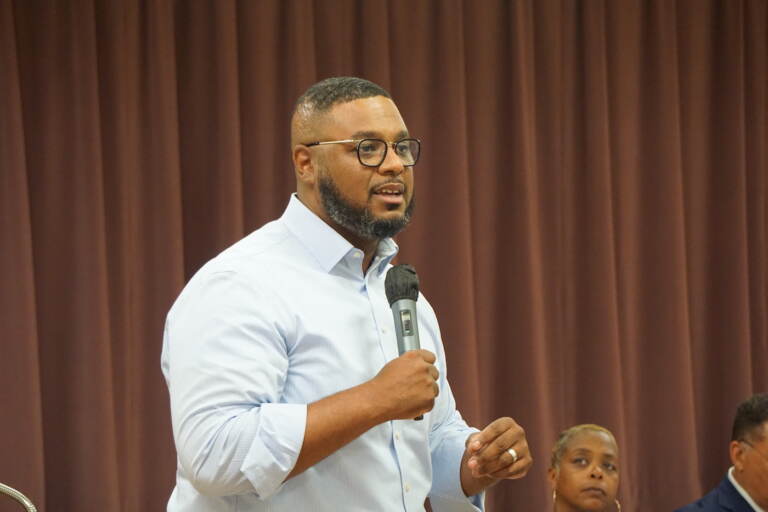
Lieutenant Governor Austin Davis addresses a crowd of antiviolence activists and elected officials in Germantown. (Sam Searles/WHYY News)
Millions of people will be watching the debate between Vice President Kamala Harris and former President Donald Trump, including many Pennsylvania voters, who will likely be crucial to both candidates in their bids to win the White House.
Among those watching will be Lt. Gov. Austin Davis, a Democrat, who says he expects Harris to stick to policy.
“I think she should really focus on her vision and how she wants to move America forward and what she’s focusing on doing,” he told WHYY News. “I think what we’re going to see out of this debate tonight is a clear contrast between the vision that Kamala Harris is offering and the vision that Donald Trump is offering for America.”
Businessman and philanthropist Jim Worthington of Bucks County, who served as delegation chair to the Republican National Convention, says he hopes that’s true. He criticized Harris for not talking to the press more about her platform.
“This is an hour and a half of intense questions and back and forth so, I think the more she talks, the better it is for Republicans and really for the country because they’re going to learn once and for all what her policies are,” Worthington told WHYY News.
Worthington added that Harris has “flip-flopped” on several issues, such as hydraulic fracturing — or “fracking.” As a candidate in 2019, she supported a ban on fracking but told CNN that she now supports the process, which fracking supporters argue helped the United States achieve energy independence and accounts for thousands of jobs in the state.
“She’s stated one thing then and now she’s trying to become more moderate,” Worthington said. “I don’t think anybody’s going to buy that.”
Davis, however, retorts that Trump has changed his position on several issues.
“He’s flip-flopped on the abortion issue multiple times, and so I think he’s kind of a hypocrite in some of those ways,” he said.
In 1999, Trump called himself “very pro-choice” but, in 2016, he presented himself as pro-life to win the Republican nomination, going so far as to say that women who obtain abortions should be punished. Most recently, he has argued the issue should be left to the states to decide.
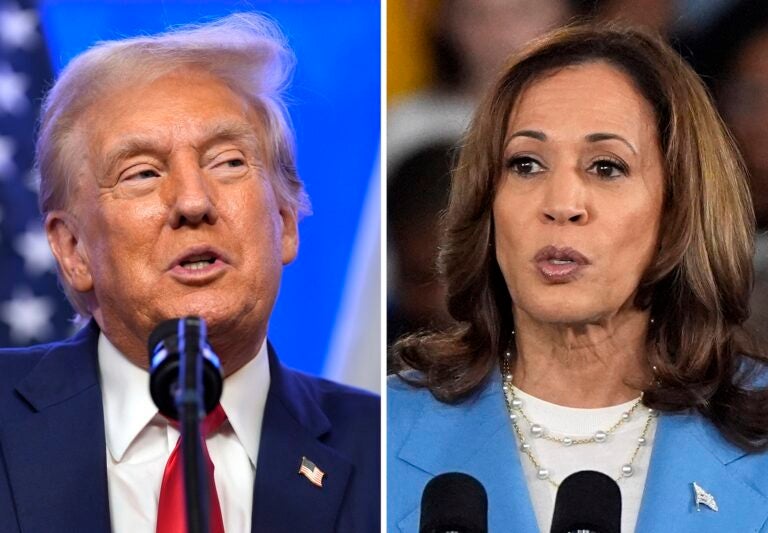
This combination photo shows Republican presidential nominee former President Donald Trump at an event, Aug. 15, 2024, in Bedminster, N.J., left, and Democratic presidential nominee Vice President Kamala Harris at a campaign event in Raleigh, N.C., Aug. 16, 2024. (AP Photo)
This year’s presidential race is a genuine contest of ideas between Vice President Kamala Harris and former President Donald Trump — with clear differences on taxes, abortion, immigration, global alliances, climate change and democracy itself.
Since replacing President Joe Biden as the Democratic nominee, Harris has pledged to chart a new way forward even as she has embraced many of his ideas. She wants middle class tax cuts, tax hikes on the wealthy and corporations, a restoration of abortion rights and a government that aggressively addresses climate change, among other stances.
Seeking a return to the White House, Trump wants to accomplish much of what he couldn’t do during a term that was sidetracked by the global pandemic. The Republican wants the extension and expansion of his 2017 tax cuts, a massive increase in tariffs, more support for fossil fuels and a greater concentration of government power in the White House.
The two candidates have spelled out their ideas in speeches, advertisements and other venues. Many of their proposals lack specifics, making it difficult to judge exactly how they would translate their intentions into law or pay for them. While the candidates agree on not taxing workers’ tips, the outcome in November could drastically change the tax code, America’s support for Ukraine, abortion access and the commitments made to limit the damage caused by climate change.
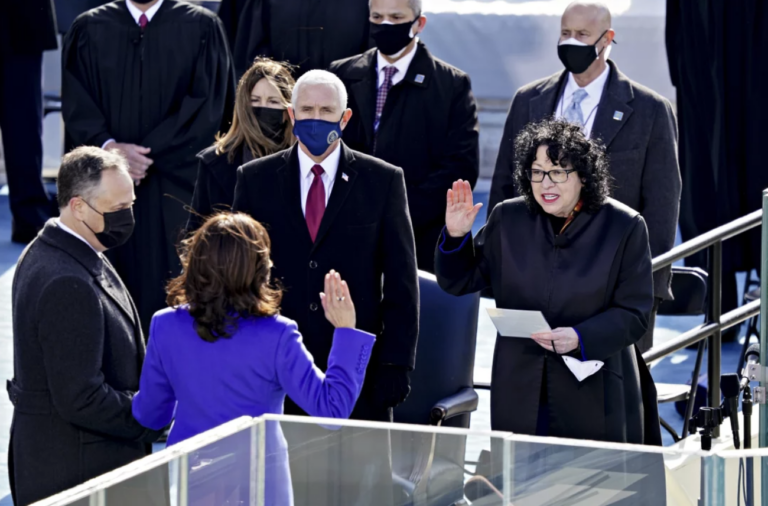
Supreme Court Justice Sonia Sotomayor (right) administers the oath of office to incoming Vice President Kamala Harris in front of the U.S. Capitol on Jan. 20, 2021, as outgoing Vice President Mike Pence (wearing blue mask) watches. (Kevin Dietsch/Getty Images)
This story originally appeared on NPR.
Tuesday night’s debate isn’t just the first matchup between former President Donald Trump and Vice President Harris. It’s their first time meeting in person.
“I was a little bit surprised, people might be surprised to hear that you have never interacted with him, met him face-to-face,” CNN’s Dana Bash said to Harris during their August interview.
Trump and Harris served in the federal government at the same time, but some logistical quirks and unusual decisions kept them from interacting directly in recent years.
Harris was elected to represent California in the U.S. Senate in 2016, during her second term as the state’s attorney general. Trump donated twice to reelect Harris as California attorney general, in 2011 and 2013, though she did not keep the money.
Trump won the presidential election the same year Harris was elected to the U.S. Senate, and both were sworn in to their respective positions in early 2017.
Harris was a member of the Senate during Trump’s first impeachment, in 2019, and voted to impeach him on both counts (he was ultimately acquitted along party lines).
Presidential candidate Trump and vice presidential candidate Harris didn’t meet in person during the 2020 election (granted, the COVID-19 pandemic had forced much of the world online).
Harris did debate Trump’s running mate, Mike Pence, in October 2020. Remember the fly?
Trump and Harris might have crossed paths at President Biden’s inauguration in January 2021, two weeks after the Capitol riot that Trump is accused of stoking. But Trump decided not to attend, becoming the first former president to skip his successor’s inauguration since Andrew Johnson in 1869.
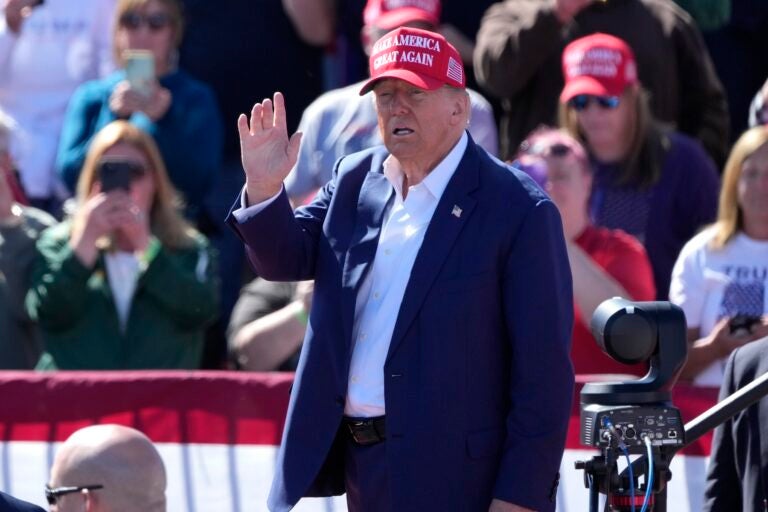
Republican presidential nominee former President Donald Trump waves as he departs a campaign event at Central Wisconsin Airport, Saturday, Sept. 7, 2024, in Mosinee, Wis. (AP Photo/Morry Gash)
Former President Donald Trump and Vice President Kamala Harris will meet face-to-face for the first time in a highly-anticipated debate Tuesday night.
The two presidential candidates describe the state of the country in starkly different terms. Trump often paints a dark picture centered around issues such as immigration and high inflation, while Harris focuses on optimism for the future, promising that “we’re not going back.”
The first debate of the 2024 election in June — at which President Joe Biden’s disastrous performance ultimately forced him from the race — featured multiple false and misleading claims from both candidates and it’s likely that Tuesday’s match-up will include much of the same.
READ MORE: A look at false and misleading claims as Trump and Harris meet for their first debate
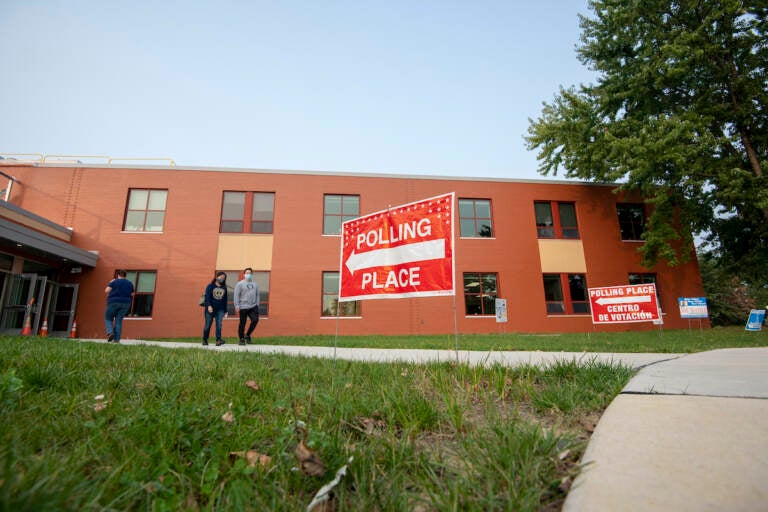
File photo: Voters head to the polls at Claymont Elementary in Claymont, Del., Tuesday, Sept. 15, 2020. (AP Photo/Jason Minto)
More than 24,400 absentee ballots were requested for the 2024 primary election in Delaware, according to the state Department of Elections. As of 5 p.m. Tuesday, fewer than 14,000 had been returned.
Still holding onto yours? There are several ways to turn it in. Here’s what to know:
If you have an absentee ballot but prefer to vote in person, bring your ballot (and the envelopes it came with) and surrender it to a poll worker. Once you’ve surrendered your mail ballot and signed a declaration, you can cast a regular ballot.
If you requested a mail ballot but didn’t receive one, head to your polling place and ask for a provisional ballot. After Election Day, officials will verify you didn’t already vote by mail and count your ballot.
Absentee ballots must be delivered to your county election office by the time the polls close at 8 p.m. Mail ballots postmarked by the deadline, but not yet received, do not count.

Delaware Gov. John Carney exits Vice President Kamala Harris campaign headquarters, July 22, 2024, in Wilmington, Del., after Harris addressed staff members. (AP Photo/Derik Hamilton, File)
The race to be the city of Wilmington’s next mayor comes down to Tuesday’s primary Election Day. Democratic candidates are urging voters to get out and vote as Tuesday’s 8 p.m. voting deadline approaches.
Gov. John Carney is seeking the role, along with former statewide officeholder Velda Jones-Potter. Carney will leave statewide office next year after two terms as governor, two terms as lieutenant governor and three terms as the state’s lone representative to the U.S. House.
Jones-Potter was appointed state treasurer in 2009 and served about two years before losing her bid for a full term. She previously worked for DuPont and MBNA.
There is no Republican candidate so whoever wins the primary would replace outgoing Mayor Mike Purzycki, who is not running for re-election.
The mayoral candidates have expressed their views on several issues facing the city in previous months, including in an August forum hosted by the Rotary Club of Wilmington.
Carney said he is running for the seat because he cares deeply about the city.
“I thought long and hard about what to do next as my term as governor comes to an end, and I really decided that I could have a bigger impact on the issues that I care about as mayor of Wilmington than I could going back to Washington, D.C.,” he said. “We’ve been knocking on doors all over the city, and it’s really confirmed my choice to take a career in public service.”
Jones-Potter said she entered the race because she wants all Wilmington residents to have a better quality of life.
“In recent years, there has been a significant focus on infrastructure and building and development and it has not equitably provided for investment and care of our neighborhoods and our communities, people within our community,” she said. “So I am looking forward to creating a better balance between our infrastructure and growth and development.”
Jones-Potter said her vision for the city includes addressing the causes of homelessness and vagrancy and creating affordable housing.
“I envision our city being one that has very strong, vibrant neighborhoods, where they’re clean and they’re safe,” she said, “where we drastically improve our schools and the education of our children.”
Carney said big priorities for him also include safe neighborhoods, good schools, and commercial development.
“I would focus on creating a strong economy with good jobs because that’s always where it starts and opportunities for small and minority-owned businesses,” he said, “which is really important to the city and its residents.”
‘We are not going back’: In Philly, a 20-foot inflatable IUD underscores the fight over abortion rights
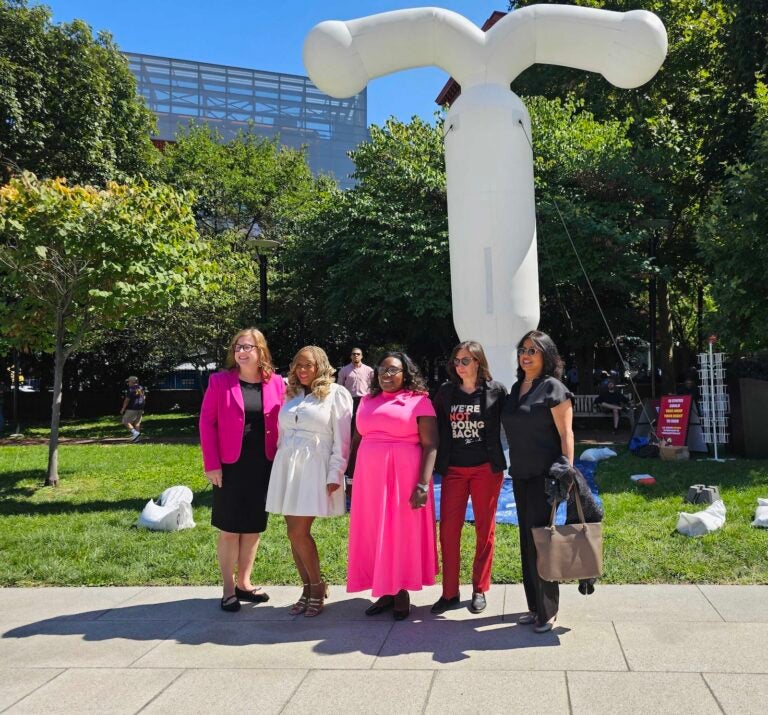
A giant inflatable IUD is situated not far from the debate site at Philadelphia's National Constitution Center. (Tom MacDonald/WHYY)
Abortion and reproductive rights are expected to play a big role in tonight’s presidential debate.
Not far from the debate site at Philadelphia’s National Constitution Center is a giant, 20-foot inflatable IUD. Her name is Freeda Womb.
Dr. Dara Kass, a board member of Americans for Contraception, said the group is using the visual aid to reinforce the importance of electing Vice President Kamala Harris over former President Donald Trump to protect abortion rights.
“She is here to draw attention to the concept that contraception is at risk,” said Kass.
Philadelphia City Councilmembers at-large Nina Ahmad and Kendra Brooks, who stopped by the inflatable IUD, were among those voicing support for Harris.
“As the mother of four daughters and three granddaughters, I will not stand by as our reproductive freedom is restricted for future generations,” Brooks posted to Instagram. “Whether it’s abortion, an IUD, or a maxipad, reproductive healthcare is crucial to the health and well-being of working families everywhere.”
For Ahmad, reproductive rights issues are “really [a] human rights issue.” “It is critical people understand what is at stake at in this election,” she said.
Brooks, who wrote that she is launching a reproductive rights task force in partnership with Mayor Cherelle Parker, said, “we are committed, and we are not going back.”
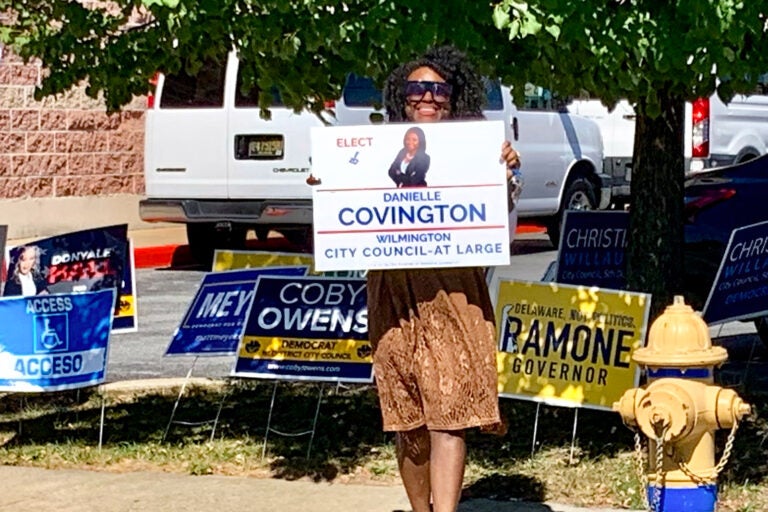
A woman is holding up a sign supporting Wilmington City Council At-Large seat Danielle Covington at the Police Athletic League polling place Sunday, Sept. 8, 2024. (Sarah Mueller/WHYY)
It’s primary Election Day in the First State, and tens of thousands of Delawareans will head to the polls to cast their vote. But many people avoided what could be long lines and took advantage of the last early voting day on Sunday, including voters in New Castle County.
In June, the Delaware Supreme Court struck down a lower court ruling that barred early voting and permanent absentee voting in the state’s general elections. Lawmakers passed a law in 2019 that allowed 10 days of early voting beginning in 2022. The permanent absentee law was approved in 2010. Early voting and permanent absentee voting in primaries and special elections is already allowed.
Department of Elections data shows at least 839 New Castle County residents cast ballots on Sunday at six locations in the area, including 233 voters at two sites in Wilmington. An enthusiastic crowd of activists and candidates mingled together a short distance from the entrance of the Police Athletic League polling location in Northwest Wilmington, waving signs to promote their campaign or their preferred candidates.
Candidate for Wilmington mayor Velda Jones-Potter and gubernatorial candidate Matt Meyer showed up at the PAL polling site to greet supporters, cast their ballots and energize their base.
Jones-Potter said she was on-site to encourage her supporters to vote and make sure they didn’t experience any trouble casting ballots.
The Department of Elections acknowledged last week that 764 affected voters statewide who were registered automatically through the Department of Motor Vehicles were given incorrect party identification due to a “clerical error.” Of the 764, 328 voters reside in New Castle County and 87 in the city of Wilmington. A DOE spokesperson said the only calls they received were from the PAL Center, all of the affected registrations have been updated, no one had been turned away and everyone has been allowed to vote.
» READ MORE: Delaware candidates monitor polling location for voting issues before polls close
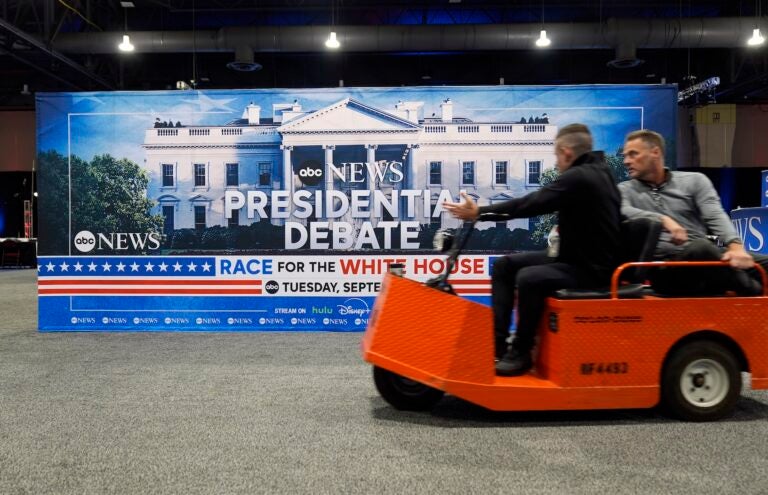
Signage at the media filing center ahead of the presidential debate between Republican presidential candidate former President Donald Trump and Democratic presidential nominee Vice President Kamala Harris, Monday, Sept. 9, 2024, in Philadelphia. (AP Photo/Pablo Martinez Monsivais)
All eyes are on Philadelphia, with Vice President Kamala Harris and former President Donald Trump slated to debate each other for the first time in the 2024 presidential campaign.
The debate, hosted by ABC News at Philadelphia’s National Constitution Center, will kick off at 9 p.m.
Though the event is closed to the public, many local and state leaders plan to host events to watch the debate unfold in real-time.
Here are some watch parties that will take place in Philly (note: some may require an RSVP).
Nonpartisan gathering at City Tap House
100 N. 18th St.
Committee of Seventy, a nonpartisan civic leadership group, will join the League of Women Voters of Philadelphia, Philadelphia Citizen and the Young Professionals Council to host a debate watch party at City Tap House, where attendees can compete for prizes and learn how to get civically involved. One free drink is included with each RSVP and light snacks will be available. Admission is free.
Dialogue at the Hilton
4200 City Ave.
Philadelphia Legislative Black Caucus members, led by Lisa Rhodes, will host state House Speaker Joanna McClinton, state Sen. Vincent Hughes and state Rep. Anthony Bellmon, among others, for their second presidential debate watch party.
The event will begin at 7:30 p.m. at the Hilton Philadelphia City Avenue, featuring dialogue and information sessions in between debate breaks. The event is open to the public, but you must RSVP to attend.
Outdoor watch party in West Philly
4862-70 Parkside Ave.
The Container Village Association will host a watch party at its outdoor market, with festivities starting at 6:30 p.m. Organizers expect 200 people to attend. The party will include a live debate viewing, a political feud game, a political scavenger hunt and mock voting. Philadelphia City Councilmembers Curtis Jones Jr. and Majority Leader Katherine Gilmore-Richardson are also invited guests.
Belmont Mansion panel and watch party
Belmont Mansion Drive
The Black Women’s Leadership Council and Women Connected will host a Connecting Dots panel discussion and presidential debate watch party at the Belmont Mansion. Doors will open at 6 p.m. and the program will begin at 6:45 p.m. Philadelphia City Commissioner Omar Sabir will be a special guest.
Philly Young Republicans watch party
433 Chestnut St.
The Philadelphia Young Republicans will host a debate watch party at Kimpton Hotel Monaco’s Lafayette South Room. The event will begin at 7:30 p.m. and Fox Nation will broadcast live with special guests, including former U.S. Rep. Jason Chaffetz (R., Utah), conservative TV personality Rachel Campos-Duffy, TV host and author Pete Hegseth and commentator Brian Brenberg. Food will be provided and there will be a cash bar.
Herstorical debate watch party
129 S. 30th St.
The PA Black Coalition for Harris will host a HERstorical debate watch party.
Organizers include PA Black Women for Harris, PA Black Men for Harris, Step, Stomp & Stroll Community Action Group and the Federation of Democratic Women. Due to an overwhelming response, the watch party was relocated to the Post restaurant at Cira Green.
Mayor Parker’s watch party at the Dell Music Center
Philadelphia Mayor Cherelle Parker, PA Dems Chairman Sen. Sharif Street and Philadelphia Democratic Party Chairman Bob Brady will be hosting a debate watch party that doubles as a Harris-Walz rally. Doors will open at 7 p.m., and the rally will begin at 8 p.m. Music, special guests and giveaways are expected.
This story originally appeared on 6abc.
The eastbound lanes of the Ben Franklin Bridge are officially closed to traffic ahead of tonight’s presidential debate.
All roads leading to the eastbound lanes of the bridge have been shut down, per the Delaware River Port Authority.
The closures include the ramp from the Vine Street Expressway (I-676) eastbound to the bridge.
Drivers are urged to take either the Walt Whitman Bridge or the Betsy Ross Bridge for travel to New Jersey.
The westbound lanes of the Ben Franklin Bridge, from New Jersey into Philadelphia, remain open.
Tuesday’s presidential debate in Philadelphia is an opportunity for swing state voters to hear Vice President Kamala Harris and former President Donald Trump define their policy platforms on the national stage.
WHYY News’ politics reporter Carmen Russell-Sluchansky is covering the debate and joined WHYY “Morning Edition” host Jennifer Lynn for a preview.
___
CR: Good morning, Jennifer.
JL: Now, the site of the debate, the National Constitution Center, is within a security perimeter which now surrounds several blocks, including WHYY and parts of Independence Mall. Access is very limited. So Carmen, who will actually be in the Constitution Center tonight?
CR: Well, the candidates obviously, and some staff aides and Secret Service, but there won’t be an audience, and even media is very limited. Most media will actually be at the filing center set up at the Convention Center several blocks away.
JL: And are there any other important people going to be around during the debate for you to talk to?
CR: There’ll be plenty of campaign surrogates around, including members of Congress and others. And some are already here, such as Wes Moore, the governor of Maryland, a Democrat who I saw at a press conference yesterday. He made the point that Harris’s primary job is going to be to motivate Democrats.
Wes Moore: This election will be determined by people who choose to vote and people who choose not to. And so I think the thing that she is going to be able to articulate and share is why it is so necessary for people to be a part of this process. That I think one of the greatest dangers that we have seen from the former president is it’s causing so much noise and chaos that I think it’s actually added to the level of skepticism that people feel about the system.
CR: So Moore said he expects former President Donald Trump to be somewhat incendiary.
JL: And what would the Democrats’ strategy be to counter that?
CR: Well, I was able to catch up with State Senator Sharif St. who is currently serving as the chair of the Pennsylvania Democrats. He told me that he expects Harris to focus on policy.
Sharif Street.: Look, I think Donald Trump is going to be Donald Trump. I think that Kamala Harris is going to present her vision for America. I think she’s not going to feed into Donald Trump’s theatrics. I think she’s going to stay focused. Let’s continue talking about the vision she has for America.
JL: OK. And what are Republicans looking to get out of this debate, Carmen?
CR: Republicans I talked to are looking for their candidate to effectively get Harris on the record when it comes to policies that she has, let’s say, evolved on since she ran in 2020. This is Jim Worthington of Bucks County, who is a large donor to Trump’s campaign and other Republican causes.
Jim Worthington: She’s stating one thing then and now she’s trying to become more moderate. I don’t think anybody’s going to buy that. So they’re going to ask her directly, point blank, you know, where do you stand on all these different things like immigration, the borders, defunding police, Israel … any number of things, fracking, there’s so many things she’s flip-flopped on.
JL: I mean, has she flip-flopped on so many things? We’ve heard about the fracking flip-flop.
CR: Well, there’s been some things that she has evolved on. When I talked to Jim Worthington, I asked him that question, are politicians allowed to flip-flop? And he said … evolving is talking about it when you’re vice president, not when you’re running for president.
JL: Who is undecided at this point and will this debate help anyone lock in their vote? Or is it really, as Gov. Moore said, that the election will be decided by the candidate who brings out their voters?
CR: Well, turnout will play a major role in the election and there aren’t that many undecided voters, but they are out there and they may have an impact given how close the race is in Pennsylvania shaping up to be. I spoke with a woman by the name of Ileen Fink who said she is still making up her mind. She feels neither candidate is addressing the issues she’s most concerned about, especially the environment and health care.
Ileen Fink: When Hillary ran against Trump years ago, I went for a completely different party, environment, independence, something like that, because I wasn’t for either one. But I think that we’ll see what the debate has to say.
JL: Carmen, Is she voting for Trump?
CR: She won’t be voting for Trump, but she hasn’t made-up her mind about Harris yet.
JL: I understand there were also some protests planned. They are planned for tonight. I’m guessing there will be an anti-war rally.
CR: Yes, the Philly Palestine Coalition is organizing a protest outside the Constitution Center, but there will also be a pro-Trump rally and an anti-abortion rally. Honestly, I’m not sure where exactly they plan to congregate given all the street closures, but our news department will be covering those as well as we’ll be at a few watch parties around the city.
JL: Excellent. Well, thank you so much. Enjoyed having you on this morning.
CR: My pleasure, Jennifer.
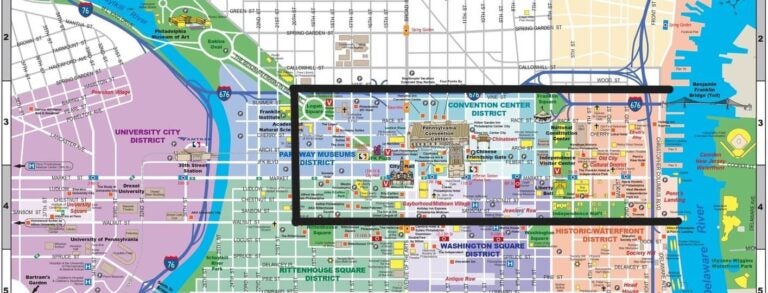
A map shows the area affected by heightened security and road closures due to the presidential debate in Old City. (City of Philadelphia)
With increased security and road closures in effect throughout Philadelphia, city offices within the Center City area will close at noon Tuesday, officials announced.
Operations will resume on Wednesday, Sept. 11.
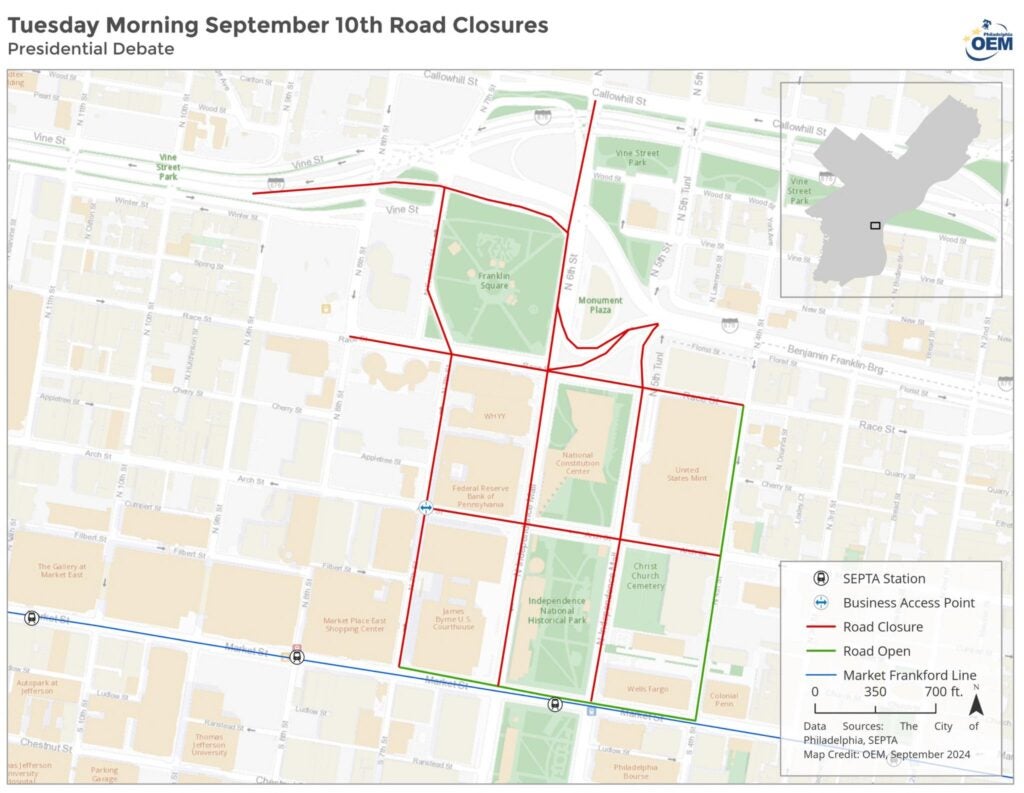

Delaware Gov. John Carney exits Vice President Kamala Harris campaign headquarters, July 22, 2024, in Wilmington, Del., after Harris addressed staff members. (AP Photo/Derik Hamilton, File)
Delaware’s most prominent elected official, President Joe Biden, may have upended the presidential race in July when he dropped his bid for a second term, but it’s the impending departures of two other prominent Democratic officeholders, Gov. John Carney and U.S. Sen. Tom Carper, that are having ripple effects throughout the ballot in Tuesday’s state primaries.
Carney will leave statewide office next year after two terms as governor, two terms as lieutenant governor and three terms as the state’s lone representative to the U.S. House. His departure has set off contested primaries for both the Democratic and Republican nominations.
The Democratic candidates are Lt. Gov. Bethany Hall-Long, New Castle County Executive Matt Meyer and National Wildlife Federation CEO and former state Natural Resources Secretary Collin O’Mara. The Republican candidates are retired police officer Jerry Price, state House Minority Leader Michael Ramone and small business owner Bobby Williamson.
Hall-Long has Carney’s endorsement and is the only candidate in the race to have previously won statewide office. But the two-term lieutenant governor has had a difficult summer after a state-ordered forensic audit of her campaign finances revealed improprieties over an eight-year period.
Emails reviewed by the Associated Press also showed that members of the lieutenant governor’s staff engaged in campaign activity on her behalf during government work hours, which is prohibited by state law. Hall-Long has disputed the findings of the forensic audit, saying the issues identified in the report were the result of minor bookkeeping errors. Nonetheless, Meyer, her primary rival, has called for a federal investigation into the matter.
Carney is barred from running for a third term as governor but will still appear on some ballots in the state as a candidate for mayor of Wilmington, Delaware’s most populous city. His opponent in the Democratic primary is another former statewide officeholder, Velda Jones-Potter, who was appointed state treasurer in 2009 and served about two years before losing her bid for a full term.
Long-Hall is also term-limited as lieutenant governor, and four women have lined up to replace her. State Rep. Sherry Dorsey-Walker, state Sen. Kyle Evans-Gay and state party vice chair Debbie Harrington are running for the Democratic nomination. Former state Rep. Ruth Briggs King is unopposed for the Republican nomination.
Carper’s announcement in 2023 that he would not seek a fifth term created the state’s first open-seat U.S. Senate race since 2010, when U.S. Sen. Chris Coons was elected to the seat Biden had vacated to assume the vice presidency. Democratic U.S. Rep. Lisa Blunt Rochester looks to replace Carper, as does Republican former Walmart executive Eric Hansen. Both are unopposed for their parties’ nominations and will not appear on Tuesday’s ballot.
With Blunt Rochester running to replace Carper in the U.S. Senate, both Democrats and Republicans will hold contested primaries to take over the seat she has held since 2017. Democratic state Sen. Sarah McBride is the best-known and best-funded candidate across both primary fields. She has the backing of Carper, Coons and Rochester, and had $1.7 million in the bank as of the end of June. Her only competitor from either party to disclose any funds raised was Republican Donyale Hall, who reported a campaign war chest of just shy of $7,500. If elected, McBride would become the first openly transgender member of Congress.
Although control of both the U.S. Senate and House may come down to just a small handful of competitive races, the seats in Delaware are expected to remain firmly in the Democratic column. Once a reliable bellwether in presidential races, Delaware has shifted heavily Democratic since the 1990s. Republicans have not won the governorship since 1988, a U.S. Senate seat since 1994 or the U.S. House seat since 2008.
About half of Delaware’s 21 state Senate seats and all 41 state House seats are up for election 2024, although only 12 districts will hold contested primaries on Tuesday. Democrats hold about two-to-one majorities in each chamber.
» READ MORE: What to expect in Delaware’s state primaries
The presidential debate between former President Donald Trump and current Vice President Kamala Harris happens Tuesday at 9 p.m., but the hefty security measures and road closures around the National Constitution Center that will come with it have already begun. And things will get worse before they get better Wednesday morning.
By early Tuesday morning, street closures will be in effect from Arch to Market streets, between 4th and 7th Streets, with Arch and Race streets completely closed off. The 6th Street exit of I-676 eastbound will also be closed. Cars and pedestrians will be allowed on 4th Street and Market Street. I-676 westbound is expected to remain open, but may close if deemed necessary. These closures will remain in effect until early Wednesday.
People who work in what city officials call the “secure zone” will need to pass through a checkpoint at 7th and Arch streets on Tuesday. Many businesses have told employees to work remotely, if possible, that day.
The eastbound lanes of the Ben Franklin Bridge from I-676 into New Jersey will be shut down from 8 to 10 p.m. Tuesday. As of now, the westbound lanes will remain open.
Delays, detours or changes to SEPTA have not been announced yet, but will be available on the transit agency’s Alert & Advisory webpage and social media.
Further information about road closures will be published on the Philadelphia Office of Emergency Management, City of Philadelphia, and the Philadelphia Police Department’s social media pages.
You can also sign up for free ReadyPhiladelphia alerts by texting READYPHILA to 888-777.
» READ MORE: What will be closed — and when — for Tuesday’s presidential debate in Philly
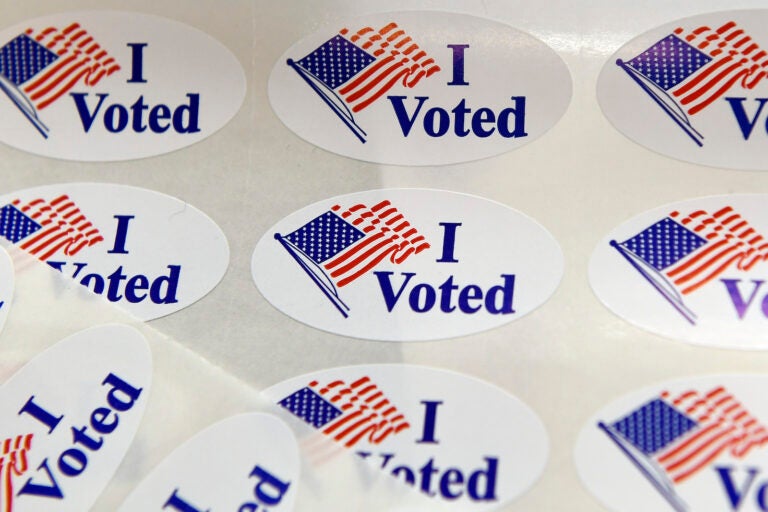
''I Voted'' stickers on display at a county elections office on Oct. 14, 2020. (AP Photo/Hans Pennink)
Delaware voters are heading to the polls to cast ballots in the state’s 2024 primary election. Polls open at 7 a.m. and close at 8 p.m.
Reporters from WHYY News are following each of the major campaigns — including the race for Delaware’s lone U.S. House seat, the race to replace John Carney as the state’s next governor and the race for Wilmington mayor.
As Election Day unfolds, follow WHYY News’ live special coverage on WHYY.org, the WHYY App and WHYY-FM.
Your voter game plan
- Have questions about the election? Our 2024 voter hub has the answers
- Looking for voter info? Here’s WHYY News’ Delaware voter guide
- Here’s what to expect from the First State’s primaries
- Want to learn more about the candidates? Here’s who’s running
- Eager for results? Follow along with WHYY as votes are tallied this evening
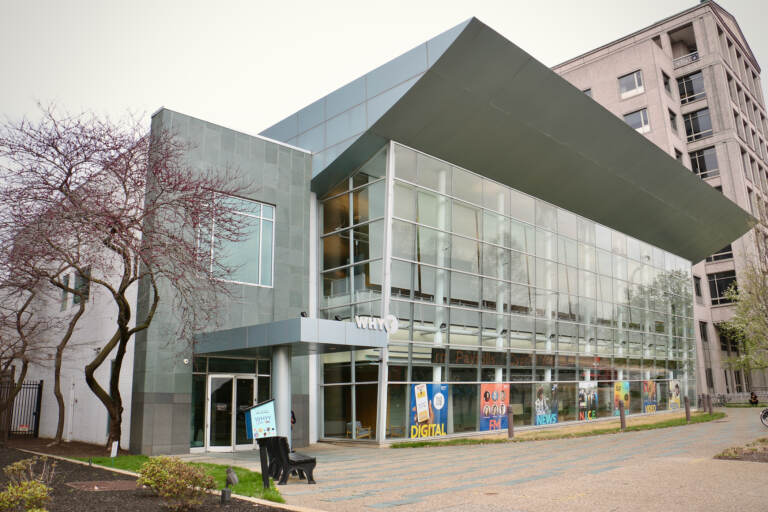
WHYY on 6th Street in Philadelphia. (Emma Lee/WHYY)
Vice President Harris and former President Donald Trump will debate each other for the first time tonight at Philadelphia’s National Constitution Center.
WHYY News and NPR will offer live special coverage, including live updates online.
The ABC News Presidential Debate will air at 9 p.m. ET for 90 minutes.
Viewers can watch live via WHYY.org, the WHYY App, WHYY TV-12 or listen live via WHYY-FM.
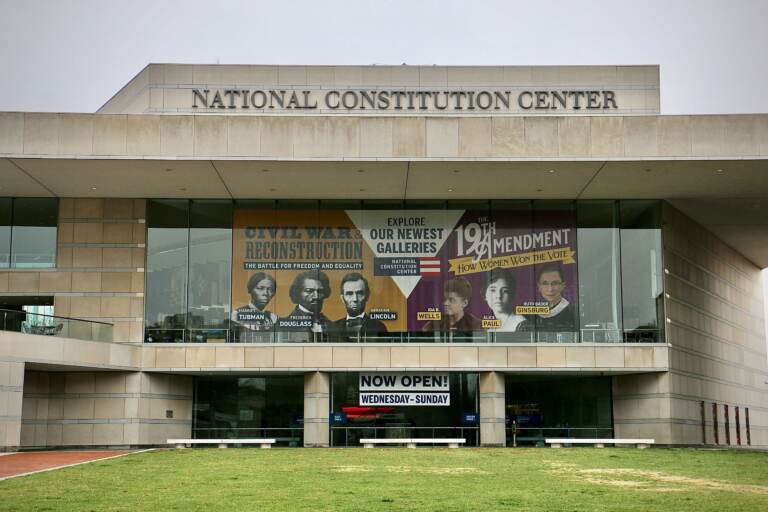
The National Constitution Center in Philadelphia. (Emma Lee / WHYY)
This story originally appeared on NPR.
Vice President Harris will face off against former President Donald Trump Tuesday for the first time since becoming the Democratic nominee.
The playing field is different than it was two months ago when President Biden’s dismal debate performance spurred a wave of concern over his ability to defeat Trump, the Republican nominee.
Since then, a lot has happened. Trump survived an assassination attempt, he accepted the GOP presidential nomination, Biden dropped out of the race and Harris then took over and clinched the Democratic party’s nomination.
Harris has since made up the ground Biden lost in swing state polls and now stands virtually tied with Trump. Despite a groundswell of support and reportedly record-breakingfundraising amounts, her campaign’s honeymoon phase is likely to end, especially as Trump and Republicans look to ramp up attacks.
Here’s what you need to know about this second debate of the 2024 presidential election cycle.
When and how to watch
The event will air at 9 p.m. ET for 90 minutes from the National Constitution Center in Philadelphia. ABC News anchors David Muir and Linsey Davis are slated to moderate the debate, which will be broadcast by the network and streamed on ABC News Live, Disney+ and Hulu.
Follow WHYY News’ and NPR’s liveblog for the latest updates, analysis, fact-checking and color; listen to and watch NPR’s special coverage of the ABC News Presidential Debate Simulcast on many public radio stations, including WHYY-FM. Viwers can also watch live coverage on WHYY.org and WHYY-TV.
What are the rules for the debate?
The debate rules echo those agreed on for the June matchup. That means microphones will once again be muted unless a candidate is speaking, something the Harris team asked to change for this debate.
It’s a rule initially proposed by the Biden campaign ahead of the first debate and was largely seen as a potential shake-up to Trump’s typical debate style. Instead, it ended up benefiting the former president, who has a history of interrupting in these settings to the point of his campaign’s detriment. Instead, the technical change helped Trump appear more controlled.
Harris’ campaign told ABC that Harris would be disadvantaged by the muted mics because it would shield Trump from direct exchanges — but said that it would agree to the terms lest Trump drop out of the debate altogether.
A campaign official, speaking on condition of anonymity to describe private negotiations, said that a pool would be on hand to hear what the candidates are saying into muted microphones — and that if there is “significant crosstalk,” the network may unmute both microphones. The moderator will warn candidates to stop frequent interruptions, the official said. “Our understanding of these things helped inform our decision to accept muted mics,” the official said.
There will be no audience and candidates will not be permitted to question each other directly. In addition, neither will be allowed to bring pre-written notes or props onto the debate stage.
What to watch for
Harris has mostly campaigned from the trail in her brief time as a presidential contender — excluding a single sit-down interview with CNN at the end of August. She has also struggled in the past with unscripted moments as vice president, which will put the spotlight on her ability to perform in a debate while also laying out some of her platform and going on the offensive against Trump.
Harris has been putting an emphasis on protecting reproductive rights while campaigning, and she’s likely to address it Tuesday night. Leading up to the debate, the Harris-Walz campaign launched its “Fighting for Reproductive Freedom” bus tour, pledging to make 50 stops in key states around the issues of abortion, IVF and reproductive rights.
Trump’s stance on this issue has been muddy. He’s made comments on abortion that appear to clash with some of his past views and statements while president. Recently, he acknowledged that Florida’s six-week ban was too restrictive, then clarified shortly after that he would not support the state’s upcoming ballot measure that, if passed, would safeguard access to abortions up until fetal viability.
Trump is likely to link Harris to Biden’s handling of the economy and immigration, two areas where Republicans have heavily criticized the White House. He may also highlight aspects of her political record, including her past support for decriminalizing border crossings and banning fracking — two policies she backed during her 2020 presidential bid and has since pivoted on.
On the other hand, Harris has repeatedly tied Trump’s platform to Project 2025, a 900-page set of policy proposals for a potential second term put forward by a conservative think tank, The Heritage Foundation. Trump has tried to distance himself from the plan — which includes further restrictions on abortion access among a slew of moves that would increase executive power.
Tuesday’s matchup also poses new stakes for Trump: He’s facing a very different opponent.
In the aftermath of the June debate, the former president’s mistakes weren’t a focus, largely because of Biden’s more noticeably poor performance. That said, Trump by no means had a perfect night, repeatedly highlighting false and misleading information. So this time, as NPR’s Domenico Montanaro pointed out, “If Harris has a solid debate, the focus could be on Trump in a way he doesn’t want.”
What’s next?
Vice presidential candidates Minnesota Democratic Gov. Tim Walz and Ohio Republican Sen. JD Vance will face off on Oct. 1 in a debate hosted by CBS News. The two hold similar roles in their respective campaigns: to appeal to voters in the “Blue Wall” states of Pennsylvania, Michigan and Wisconsin this fall.
It’s unclear whether Harris and Trump will debate a second time. No additional dates have been formally announced.
NPR White House Correspondent Tamara Keith contributed reporting.


